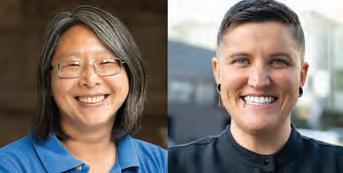



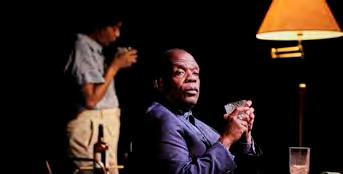
SF deficit imperils Latino HIV funding
by John Ferrannini
Though Latino cisgender men now make up the highest rate of new HIV diagnoses in San Francisco, more funding toward organizations that serve the community may not be forthcoming due to the city’s projected budget deficit.
Indeed, the struggle this year will be maintaining current levels of funding to fight HIV, according to the co-chairs of the HIV/AIDS Provider Network, or HAPN, which advocates with city officials for funding.
As the Bay Area Reporter previously reported, San Francisco’s HIV Epidemiology Annual Report for 2022, released December 5, 2023, showed that Latinos were the only group to see an increase in new cases (67 of 157 cases, or 43% of new diagnoses, up from 36% in 2021). Among cis men the rate of diagnoses surpassed all other racial or ethnic groups measured.
“It’s going be a challenging budget year, so our top priority is preventing cuts and keeping everyone’s heads above water,” Laura Thomas, senior director of HIV and harm reduction policy at the San Francisco AIDS Foundation and one of the HAPN co-chairs, told the Bay Area Reporter. “I think it is obvious, when you look at the report, that the city needs to be doing more in the Latinx community and that this needs to be a priority in terms of preventing new HIV transmission.”
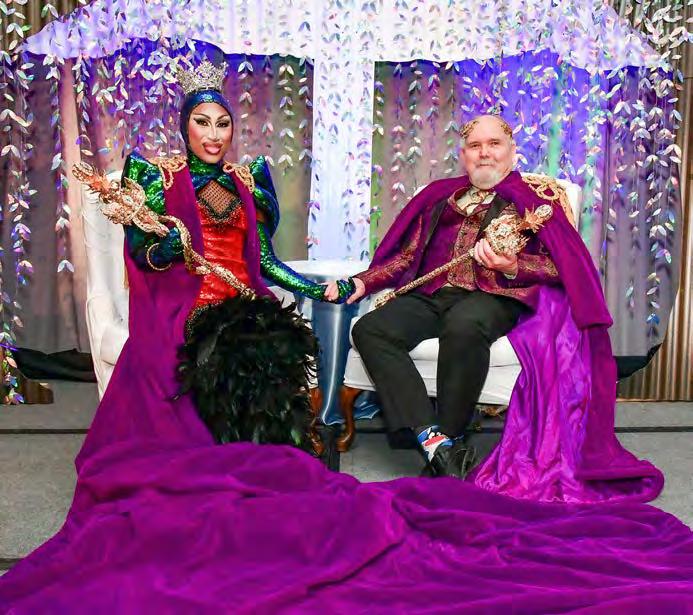
Gooch
SF Imperial Court crowns royalty
The Imperial Council of San Francisco held Coronation 59 Saturday, February 24, at the Hyatt Regency Hotel. This year’s theme was “Seasons of Love.” The new Most Imperial Majesties are Empress Linda Summers, left, and Emperor Bob Glas. Their court will be
B.A.R. election endorsements
CALIFORNIA PRESIDENTIAL PRIMARY
President: Joseph R. Biden Jr.
U.S. Senate: Barbara Lee
Congress (Bay Area):
Dist. 2: Jared Huffman
Dist. 4: Mike Thompson
Dist. 8: John Garamendi
Dist. 9: Josh Harder
Dist. 10: Mark DeSaulnier
Dist. 11: Nancy Pelosi
Dist. 12: Lateefah Simon
Dist. 14: Eric Swalwell
Dist. 15: Kevin Mullin
Dist. 16: Evan Low
Dist. 17: Ro Khanna
Dist. 18: Zoe Lofgren
CA Assembly
Dist. 14: Buffy Wicks
Dist. 16: Rebecca Bauer-Kahan
Dist. 17: Matt Haney
Dist. 18: Mia Bonta
Dist. 19: Catherine Stefani
Dist. 20: Liz Ortega
Dist. 21: Diane Papan
Dist. 24: Alex Lee
Dist. 25: Ash Kalra
Dist. 26: Patrick Ahrens
CA Senate
Dist. 3: Christopher Cabaldon
Dist. 7: Jovanka Beckles
Dist. 9: Marisol Rubio
Dist. 11: Scott Wiener
Dist. 13: Josh Becker
Dist. 15: Dave Cortese
Dist. 17: John Laird

SF Judges
Seat 1: Michael Isaku Begert
Seat 13: Patrick Thompson
Alameda County Judge
Seat 12: Michael Johnson
OTHER RACES
Alameda County Board of Supervisors
Dist. 4: Jennifer Esteen
Dist. 5: John Bauters
Alameda County Board of Education
Area 2: Angela Normand
San Francisco Democratic Party Central Committee
AD 17: Trevor Chandler, Vick Chung, Matt Dorsey, Peter Gallotta, Emma Heiken, Jane Kim, Jeremy Lee, Anita Martinez, Michael Nguyen, Joshua Rudy Ochoa, Sal Rosselli, Joe Sangirardi, Sydney Simpson, Luis Zamora
AD 19: Michela Alioto-Pier, Dan Calamuci, Connie Chan, Mike Chen, Sandra Lee Fewer, Natalie Gee, Parag Gupta, Hene Kelly, Gordon Mar, Mano Raju,
SAN FRANCISCO PROPS
Yes on: A, C, D, G
No on: B, E, F
CALIFORNIA PROPS
Yes on: 1
Remember to vote by March 5!
called El Gran Sol of Passion, Resilience, and Universality. The new titleholders will now embark on a year of charitable work for the council, which was formed decades ago to raise funds for LGBTQ and HIV/AIDS causes.
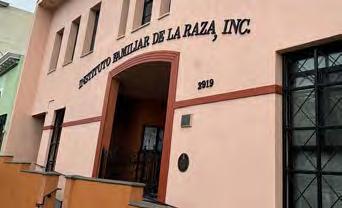
Instituto Familiar de la Raza is one of the main providers of HIV services to San Francisco’s Latino community.
SF nonprofits on frontlines of HIV in Latino community
by John Ferrannini
Health advocates and organizations that serve the Latino community in San Francisco say the city needs to do more to help prevent new HIV diagnoses and assist those living with HIV and AIDS in light of a dismal report from the health department late last year.
However, the need comes just as the city is experiencing funding cuts and a budget deficit. As the Bay Area Reporter previously reported, those in charge of advocating for HIV/AIDS funding say that the priority this year will be to hold the line on current funding levels.
San Francisco’s HIV Epidemiology Annual Report for 2022 showed Latinos were the only racial or
See page 2 >>
Lesbian bartender sues Red Lobster
by John Ferrannini
ASan Francisco butch lesbian bartender is suing the Red Lobster casual dining chain, alleging that her supervisor discriminated against her in violation of the California Fair Employment and Housing Act.
Nora Nunez’s attorney, Chambord Benton-Hayes of Benton Employment Law, filed the lawsuit in San Francisco Superior Court February 22 against Red Lobster Hospitality LLC; her former manager Michael Waller; and Geoff Reder, who, as director of operations for Red Lobster, did not conduct a formal investigation when the matter was brought to his attention, the civil complaint in the case states.
The lawsuit accuses the manager and operations director of treating Nunez differently because of her sexual orientation and gender expression, a news release from her attorneys stated. She had worked for the company for 11 years.
At the time Nunez, 42, was working as a bartender for Red Lobster in San Bernardino when in November 2021 Waller became the general manager of the location Nunez was working at.
“Being a bartender brought her joy because she loves people,” the civil complaint states. “Her goal each night was to ensure that every customer left their worries at the door and enjoyed their meal with great food, a drink or two, and, hopefully, a little laughter. This all abruptly changed when Michael Waller became her General Manager. She quickly realized that he disliked her because she was a butch lesbian. He targeted her relentlessly.”
The complaint states that one way Waller targeted Nunez was by being “rude, standoffish, and dismissive to Nunez whereas he was friendly and gregarious with other employees and customers.”
“As an example of his consistently churlish behavior toward Nunez, Waller on one occasion gave chocolates to all of the employees except Nunez,” the complaint states.
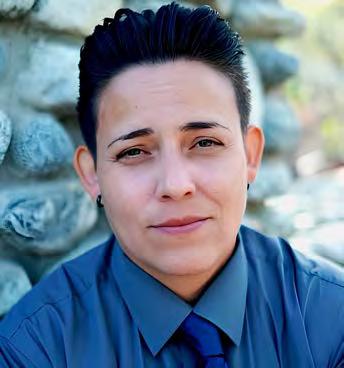
“He further demonstrated his disparate treatment of other employees by allowing one employee to park in ‘no parking zones’ without comment or complaint and allowing sexually harassing comments to permeate the workplace.”
In a February 26 phone interview with the B.A.R., Nunez said that in front of several officials visiting from corporate, Waller told her “I don’t care what they say, you’re going to do what I say.”
“If I was around, I was the one to blame,” she recalled. “I’m the only butch dyke in the restaurant – so I know for a fact it was the fact I look butch.”
Nunez said a more feminine-presenting lesbian faced no problems from Waller; in fact, she got perks.
“He was all over her,” Nunez recalled. “I loved Red Lobster. I loved Red Lobster for 11 years of my life, and I gave it everything I had. I loved my crew and every single place I worked – till Mr. Waller came along.”
See page 5 >>
Serving the lesbian, gay, bisexual, transgender, and queer communities since 1971 www.ebar.com Vol. 54 • No. 9 • February 29-March 6, 2024 'Baldwin and Buckley' ARTS 13 13 ARTS Traveling to Cuba 09 07 The A look at DCCC race 'Big Data'
See page 5 >>
John Ferrannini
Former Red Lobster bartender Nora Nunez
Courtesy Benton Employment Law
D9 supe hopefuls speak up over Latino HIV cases
by John Ferrannini
For decades San Francisco’s efforts to stem the tide of HIV infections in the Latino community have largely focused on the city’s Mission neighborhood, where a number of nonprofits providing health care services to a predominantly Spanish-speaking clientele are located.
Representing the neighborhood and its needs at City Hall is the District 9 supervisor. With incumbent Supervisor Hillary Ronen termed out of office early next year, her successor will be elected in November.
As such, the Bay Area Reporter queried the candidates running in the race on what can be done to stem the tide of new HIV cases in the city’s Latino community. As the B.A.R. previously reported, Latinos were the only group to see an increase in new cases (67 of 157 cases, or 43% of new diagnoses, up from 36% in 2021), according to San Francisco’s HIV Epidemiology Annual Report for 2022.
New HIV cases increased more among Latinos than any other group in 2022, according to the report that was released December 5, 2023.
After a debate January 17, candidate Stephen Torres, a queer Latino man who used to be on the Castro LGBTQ Cultural District board and the city’s entertainment commission and who works at Twin Peaks Tavern on Castro Street, told the B.A.R. that he agreed with the points about cultural competency made in a separate interview with Gustavo Ordonez, a gay man who is a program manager at AGUILAS, a longtime HIV/ AIDS nonprofit catering to the Latino community. Ordonez told the B.A.R. that “just because you translate a program into a language doesn’t mean it’s focused on that community.”
In other words, materials should be translated in a more culturally appropriate way, not just translated directly from English to Spanish.
Torres said there needs to be more of an effort to reach targeted populations where they are already.
“There needs to be more collabora-
<< Latino community
From page 1
ethnic group to see an increase in new cases, and among cis men the rate of diagnoses surpassed all other racial or ethnic groups measured. This was the first time Latino men made up the highest rate of new diagnoses.
Instituto Familiar de la Raza is one of the organizations on the frontlines of HIV prevention and care. Last year the city awarded the Mission neighborhood-based organization a $2 million
tion, working together to close the gap,” Torres said. “We need to go out into the places where queer people of color gather.”
Candidate Trevor Chandler, a gay man who sits on the California State Board of Pharmacy, referred to a PrEP bill by gay state Senator Scott Wiener (D-San Francisco) that Governor Gavin Newsom recently signed.
“We must remove as many barriers as possible to make PEP and PrEP universally accessible on demand,” he told the B.A.R., referring to post- and preexposure prophylaxis. “I’ve been proud to support legislation on the California State Board of Pharmacy, authored by Senator Scott Wiener, to do just that.”
Chandler was referring to Senate Bill 339. It authorizes a pharmacist to furnish up to a 90-day course of PrEP, and requires the California State Board of Pharmacy to adopt emergency regulations to implement these provisions by July 1.
PEP, or post-exposure prophylaxis, is a medication regimen taken soon after a possible exposure to prevent HIV. PrEP refers to pre-exposure prophylaxis and is medication taken daily.
Candidate Jackie Fielder, a queer Mexican and American Indian woman, echoed the cultural competence matter in her statement to the B.A.R.
“We need language equity, getting materials translated, and deep partnership with groups that work with undocumented people to get people info and care from trusted sources,” Fielder stated. “I’m in touch with people deeply involved with the Getting to Zero program.”
The city’s Getting to Zero program aims to reduce new HIV transmissions and HIV deaths by 90% by 2025, in addition to reducing stigma.
Candidate Roberto Hernández, a Latino man and straight ally known as the “Mayor of the Mission,” stated in an emailed message, “Since the beginning of the AIDS epidemic the city of SF has failed to adequately address the impact on the Latino community.”
“At one point I proposed to the Department of Public Health and UCSF
request for proposal to run a Latina/o/x Access Point at 1663 Mission Street, in partnership with the San Francisco AIDS Foundation and the Mission Neighborhood Health Center.
“We receive different types of clients here,” said Jeremias Rivera, a gay man who is the program manager of Sí a la Vida-Integrated HIV Services at IFR. “What we do is connect them to linkage to gain access to services.” The AIDS foundation also has its own separate and long-running Programa Latino/Latine.
to test members of our community at the Carnaval San Francisco two-day festival,” Hernández stated, referring to the popular annual May festival in the Mission that he’s produced for decades.
“I got some pushback from them since they felt it was a party and people would not want to be tested. I argued that those were exactly the people they needed to test. Ultimately, they agreed. The second day of the festival they panic because they ran out of needles to test people.”
The B.A.R. asked Hernández when DPH and UCSF pushed back against testing at Carnaval, and he stated it was in 1988. A DPH spokesperson declined to comment. UCSF deferred to DPH, “since it’s not a UCSF issue or decision,” a spokesperson stated.
Candidate Michael Petrelis, a gay man who is a longtime AIDS activist, stated, “All recent HIV stats must be scrutinized in the context of COVID19-related fluctuations in testing patterns across demographic categories.”
“The health department’s latest epidemiological report noted positive developments not widely reported: ‘San Francisco continues to excel in many of the HIV prevention and care indicators […] and new diagnoses remain relatively low,’” Petrelis stated. “Statistically, Latinos have a stable infection rate and we need to build on the existing assets to drive the numbers down.
“Release of the new figures, as is always the case with DPH, wasn’t shared at a community meeting in the Mission in coordination with social service agencies serving the Latino gay male community,” he added. “No effort was made to invite the public, especially sexually active queers of all races, to hear DPH plans addressing their needs for public insurance and health care on-demand regardless of ability to pay. Respectful engagement with the AIDS community was lacking as DPH generated alarming headlines and would go far to build cultural competency with at-risk of infection persons.”
Candidate Julian Bermudez said that he believes in an “alternative approach.”
Meanwhile, over at AGUILAS, a longtime HIV/AIDS nonprofit catering to the Latino community, financial woes may force the agency to scale back services even more than it already has.
Such is the state of HIV services geared toward the city’s Latino population.
The priority, those whose HIV prevention and education work targets the city’s Hispanic and Latino communities say, is that they need more funding and culturally competent services now as the population sees higher numbers of diagnoses even as other groups see declines.
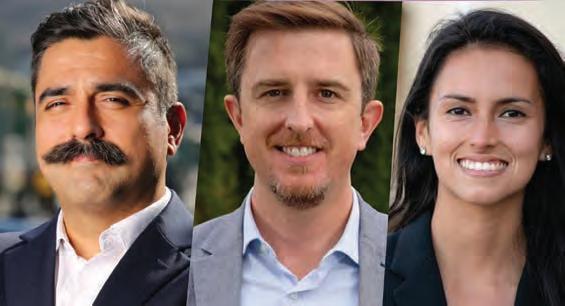
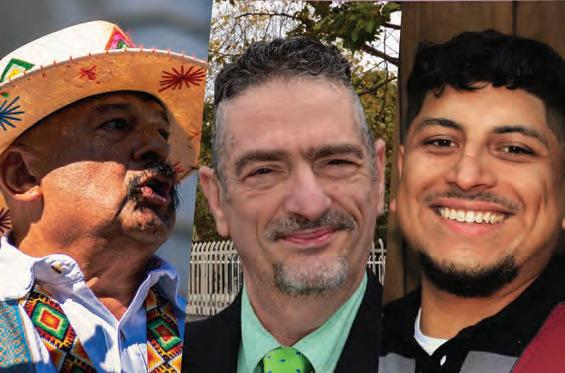
“The city of San Francisco can only do so much in sex education and STI prevention,” he stated in an email, referring to sexually transmitted infections. “The biggest hurdle the Latinx community has is the stigma surrounding getting tested and its accessibility. This issue can be approached by targeted marketing that normalizes regular health screenings.
“My suggestions are to promote these
AGUILAS
One of those programs facing issues with funding stability is AGUILAS, which these days is tucked away in a fourth floor office at the San Francisco LGBT Community Center. (AGUILAS stands for Asamblea Gay Unida Impactando Latinos A Superarse, or in English, Assembly of Gays United Impacting Latinos to Supersede.)
The organization’s gay longtime Executive Director Eduardo Morales, Ph.D., said funding from the city went from $426,621 for Fiscal Year 2022-23
local organizations and resources to the Latinx community as a whole. Having collaborations with prominent queer Latinx artists and celebrities,” he added.
Bermudez said that promotional materials tend to “be more ‘straight leaning’” sometimes. He stated a good idea would be “to have a testing area or promotional booth at all major events throughout the Bay Area.”
The B.A.R. reached out to candidate Rafael Gutierrez but did not hear back. t
through the San Francisco Department of Public Health, to less than $200,000 for Fiscal Year 2023-24 through the Mayor’s Office of Housing and Community Development.
Asked how AGUILAS will get funding from the city in fiscal year 2024-25, Morales said, “We don’t know.”
“We got funding through June 30,” Morales said. “We’re hoping they will continue funding us, but we don’t know what the situation is going to be.”
See page 8 >>


2 • Bay area reporter • February 29-March 6, 2024 t 415-626-1110 130 Russ Street, SF okellsfireplace.com info@okellsfireplace.com OKELL’S FIREPLACE Valor LX2 3-sided gas fireplace shown here with Murano glass, and reflective glass liner
<< Health News
District 9 supervisor candidates Stephen Torres, left, Trevor Chandler, and Jackie Fielder
Courtesy the campaigns
District 9 supervisor candidates Roberto Hernández, left, Michael Petrelis, and Julian Bermudez
Hernandez, Jeremy Word; Petrelis, Rick Gerharter; Bermudez, courtesy the candidate


Unfortunately, however, the need comes as the city stares down a budget deficit that could be as large as $1 billion – and some programs have already seen huge cuts and don’t have funding stability.
The city’s two-year budget process for fiscal years 2024-25 and 2025-26 is now getting started. Thomas and Lance Toma, CEO of the San Francisco Community Health Center and the other HAPN cochair, said that just keeping funding at current levels will be difficult considering the budget crunch.
Last year’s budget included $1.25 million for housing subsidies for people living with HIV for 2023-24 and $500,000 for 2024-25. The budget also included $500,000 to help HIV/AIDS nonprofits with rising costs, as the B.A.R. previously reported. The funding was far short of the $7 million requested by HIV advocates.
In December, Mayor London Breed asked city departments for 10% cuts across the board. A deficit of about $800 million is expected over the next two fiscal years, and Breed has said it could reach $1 billion by Fiscal Year 2028.
“So we’re doing everything we can to meet with the mayor’s office, the health department, with our champions on the Board of Supervisors, to ensure we do everything we can to protect and preserve the current safety net,” Toma said.
DPH figures show
HIV increased among Latino cis men
The health department’s epidemiology report was a wake-up call for many HIV/AIDS leaders.
“Since 2018, the largest number of new HIV diagnoses have been among Latinx, and the annual rate of new diagnoses among Latino cis men surpassed all other racial/ethnic groups in 2022,” the report stated. “Compared to other racial/ethnic groups, Latinx San Francisco residents were the least likely to have any evidence of HIV care, and both Latinx and Black/African American San Franciscans were virally suppressed at a rate lower than White San Franciscans.”
This was the first time Latino men made up the highest rate of new diagnoses.
According to the 2020 U.S. census, 15.6% of the city’s population is Hispanic or Latino. That’s 136,761 people, about 20,000 of whom lived in the Mission neighborhood at the time of the census (https://medasf.org/what-doesdisplacement-look-like-part-1-census2020-and-latinos-in-the-mission/).
Asked why this is happening, Dr. Stephanie Cohen, a straight ally who is the section director for HIV/STI prevention with the health department, told the B.A.R., “I think lack of access to health insurance is an important driver, but certainly not the only driver.”
Indeed, the report did find Latinos
<< Red
From page 1
In December 2021, Waller “denied an employee’s request for time off because she was ill and had COVID-19 like symptoms,” the complaint alleges. Nunez approached Waller about this but her warnings went unheeded.
“For the remainder of her shift, he behaved unkindly and curtly with Nunez,” the complaint states. “Shortly thereafter, a COVID-19 outbreak occurred among the employees of the restaurant.”
In June 2022, Nunez brought her complaints about Waller up the chain of command to Reder, the complaint states.
“Reder reassured Nunez that it would be ‘okay’ and that he would discuss these matters with Waller,” the complaint states. “Thereafter, no formal investigation was conducted and Waller’s mistreatment and discrimination escalated. On or about June 3, 2022, within days of formally complaining about Waller’s mistreatment and discrimination that resulted in no formal investigation, and after the confrontation with Waller about park-
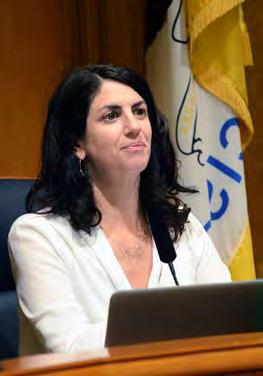
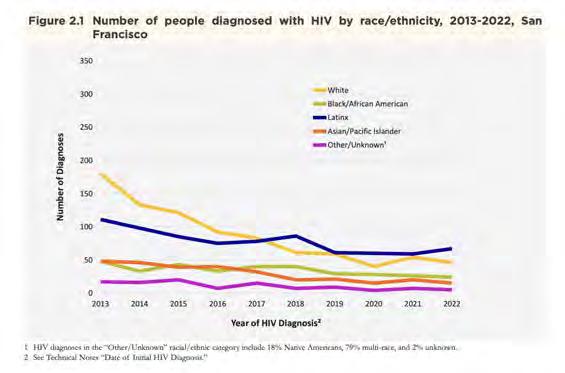
were the largest group without insurance at the time of diagnosis, with 34% reporting no insurance and 7% missing insurance.
“There’s social determinants of health that drive the risk of HIV, STIs, and other communicable diseases, like COVID, which had a disproportionate impact on the Latinx community in San Francisco: things like poverty, access to housing, racial and ethnic discrimination, and in the context of the Latino community, acculturation, stress, and fears of deportation in seeking safety net services,” Cohen said.
Funding a priority
The priority, those whose HIV prevention and education work targets the city’s Hispanic and Latino communities say, is that they need more funding and culturally competent services now as the population sees higher numbers of diagnoses even as other groups see declines.
There are several agencies in the city that work specifically with the city’s diverse Hispanic and Latino communities. One of those is Instituto Familiar de la Raza, which the city awarded a $2 million request for proposal to run a Latina/o/x Health Access Point at 1663 Mission Street, in partnership with the AIDS foundation and the Mission Neighborhood Health Center.
In addition, the AIDS foundation has its own Programa Latino/Latine, and AGUILAS is run out of the San Francisco LGBT Community Center at 1800 Market Street. One of those who participates in AGUILAS’ programs is Mario Flores, a gay HIV-positive Mission neighborhood resident who has been involved with the nonprofit for three years. He goes to a Tuesday night support group and has participated in some of the aforementioned training programs.
“It has, definitely, created a sense of community building and I became aware of the resources in the community as an LGBT person,” Flores said. “AGUILAS is one of the groups supporting
ing in the ‘no parking zone,’ Nunez received her first disciplinary warning in eleven years of employment.”
Things only got more fraught from there, the complaint alleges.
“Doubling down on the continued harassment and retaliation, on or about June 30, 2022, Waller called Nunez and told her she was suspended without pay for bullying, which was another deliberate swing at her butch lesbian identification,” the complaint states.
“It is a stereotypical misconception that butch lesbians are aggressive and are bullies, which was in line with the perceived opinions of Waller towards butch lesbians,” the lawsuit states.
“Nunez denied the allegations and asked who she was allegedly bullying, but Waller refused to name specific individuals. Waller stated that it was ‘multiple people’ and that ‘I should not have to ask you not to bully people.’ Waller then abruptly hung up the phone.”
In July 2022, four days after the Workers’ Compensation Appeals Board served a notice that Nunez had filed a complaint with it, Nunez was terminated by Waller and Reder, the complaint states.
See page 11 >>
the Latino community but there is not much visibility, because of its funding limitations. It can do so much.”
Thomas said, “It’s going to be a very challenging budget year where we have to focus on existing services. I’d love to be in the position of advocating for expanded services, but I don’t think that’s going to be possible this year, which is a problem.”
District 9 Supervisor Hillary Ronen, a straight ally who represents the Mission neighborhood on the board, told the B.A.R. that “we will absolutely bring this up with the mayor when she’s finalized her budget.”
“Obviously, her budget director will talk to all of the supervisors about what their priorities are, and this will be up there as a priority for our office. But that said, it was a horrendous budget year, since they just started with the IFR RFP, I’d imagine they will want to see how that impacts things. Us, the gay members of the Board of Supervisors and me, are advocating for HIV funding. I can’t imagine this year will be any different given the real need the Latino community is having.”
Gay District 8 Supervisor Rafael Mandelman, who represents the Castro neighborhood on the board and is a member of its budget committee,
told the B.A.R., “Although encouraging to see that HIV cases are down slightly from the 2021 numbers, the rise in HIV cases within the Latino community is alarming.”
There were 157 new HIV diagnoses in the city in 2022, down slightly from 166 in 2021, according to the DPH report.
“Plainly we need additional resources in education, preventative care, and treatment to combat this trend,” Mandelman said. “At a time when Republicans in Congress are threatening cuts to federal HIV funding, it will be all the more important for San Francisco to prioritize getting all our communities to zero new infections in the upcoming budget cycle.”
The city’s Getting to Zero program aims to reduce new HIV transmissions and HIV deaths by 90% by 2025, in addition to reducing stigma.
Dorsey did not return messages seeking comment.
When asked for comment, gay District 4 Supervisor Joel Engardio, who represents the Outer Sunset on the board, stated, “I haven’t had a chance to look into that so don’t have comment beyond we need to do what we can to lower HIV rates.”


Other concerns for Latinos
As the B.A.R. previously reported, Latino men in the city were disproportionately affected by the mpox outbreak in 2022, and around that time U.S. Senator Alex Padilla (DCalifornia) called out the racial and ethnic disparity of the government’s response.
While they were less at risk, it was white Americans who received a disproportionate number of vaccinations.
Cohen said that the city has a “robust safety net that ensures there is access to HIV prevention and sexual health services, including for those who are uninsured, at places like San Francisco City Clinic and Magnet at the San Francisco AIDS Foundation in the Castro.”
But Cohen added that the framework for communicating with people who need to be reached might not be so strong.
“I think those who are uninsured are not necessarily aware those services exist, and therefore may not be seeking them out,” she said. “I think it’s important to add that these disparities are of great concern for all of us at the San Francisco Department of Public Health, and working to ensure we are getting to zero for all communities is a priority for the health department.”
To that end, Cohen said that the department is “working to ensure we are providing culturally affirming, language concordant, low barrier services to all individuals, including those who are Latinx.”
These include the above mentioned access point, which is one of seven DPH health access points.
“That is one of our many strategies aimed at improving low-barrier access to services, HIV prevention and sexual health services,” Cohen said. t
Editor’s note: This story is one of two focusing on HIV prevention efforts in San Francisco’s Latino community in the aftermath of the city’s annual HIV report for 2022.
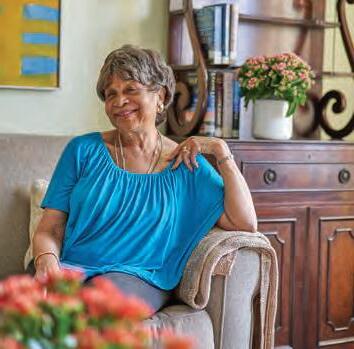
February 29-March 6, 2024 • Bay area reporter • 5 t Your life is full of intention, connection and possibilities. Here you’ll find a community that nurtures what truly matters to you. So go ahead, craft your days at Spring Lake Village with moments that fulfill and people that inspire and help you flourish. Your new home awaits. INDEPENDENT LIVING | ASSISTED LIVING SKILLED NURSING | REHABILITATION | MEMORY CARE Schedule a tour now. 707.579.6964 | springlakevillage-sr.org CHOICES License 490107656 / COA #352 5555 Montgomery Drive, Santa Rosa From the Cover>> << SF deficit From page 1 The San Francisco Department of Public Health’s 2022 HIV Epidemiology Report showed that new HIV cases increased for Latinos more than any other group. Courtesy SFDPH
Lobster
District 9 Supervisor
Hillary Ronen
Rick Gerharter
Volume 54, Number 9
February 29-March 6, 2024 www.ebar.com
PUBLISHER
Michael M. Yamashita
Thomas E. Horn, Publisher Emeritus (2013)
Publisher (2003 – 2013)
Bob Ross, Founder (1971 – 2003)
NEWS EDITOR
Cynthia Laird
ARTS & NIGHTLIFE EDITOR
Jim Provenzano
ASSISTANT EDITORS
Matthew S. Bajko • John Ferrannini
CONTRIBUTING WRITERS
Christopher J. Beale • Robert Brokl
Brian Bromberger • Victoria A. Brownworth Philip
Campbell • Heather Cassell
Michael Flanagan •Jim Gladstone
Liz Highleyman • Brandon Judell • Lisa Keen
Philip Mayard • Laura Moreno
David-Elijah Nahmod • J.L. Odom • Paul Parish
Tim Pfaff • Jim Piechota • Adam Sandel
Jason Serinus • Gregg Shapiro
Gwendolyn Smith • Charlie Wagner
Ed Walsh • Cornelius Washington • Sura Wood
ART DIRECTION
Max Leger
PRODUCTION/DESIGN
Ernesto Sopprani
PHOTOGRAPHERS
Jane Philomen Cleland
Rick Gerharter • Gooch
Jose A. Guzman-Colon • Rudy K. Lawidjaja
Georg Lester • Rich Stadtmiller
Christopher Robledo • Fred Rowe
Shot in the City • Steven Underhill • Bill Wilson
ILLUSTRATORS & CARTOONISTS
Christine Smith
VICE PRESIDENT OF ADVERTISING
Scott Wazlowski – 415.829.8937
NATIONAL ADVERTISING REPRESENTATIVE
Rivendell Media – 212.242.6863
LEGAL COUNSEL
Paul H. Melbostad, Esq.


Bay
A
Director: Scott Wazlowski
News Editor • news@ebar.com
Arts Editor • arts@ebar.com
Out & About listings • jim@ebar.com
Advertising
Feds must probe Nex Benedict’s death
The U.S. Department of Justice needs to open an investigation into the death of nonbinary Oklahoma high school student Nex Benedict. While the police in Owasso, a small town outside of Tulsa, continue to investigate Benedict’s death, the Sooner State does not have a hate crimes law that includes sexual orientation and gender identity. The federal government does – the Matthew Shepard and James Byrd Jr. Hate Crimes Prevention Act –and Attorney General Merrick Garland needs to deploy a team of federal DOJ investigators to the scene. Additionally, the federal Department of Education should investigate the state education department, as called for this week by the national Human Rights Campaign.
As has been widely reported, Benedict, 16, was involved in a physical altercation February 7 in a bathroom at Owasso High School, where they were a 10th grader. According to text messages from Benedict that they shared with a family member that were reported by local TV news, they reported being “jumped at school. 3 on 1, had to go to the ER.” Benedict returned home, but the next day collapsed at their grandmother/guardian’s home and died.
In a newly released video, police interviewed Benedict at the hospital. “I don’t know their names, I don’t know them,” Benedict said of the alleged attackers, though they added the girls had criticized their attire in the past. Benedict said that they had tried to ignore past bullying, and so didn’t report it, but the day of the fight, they were mocked for how they were laughing while talking with friends in the bathroom.
“They were talking about us in front of us,” Benedict said.
Benedict told the officer interviewing them at the hospital that they poured water from their water bottle on the girls after those remarks, after which the girls grabbed Benedict’s hair. Benedict was then thrown onto the ground and beaten up after throwing one of the girls at a paper towel dispenser.
Benedict lost consciousness. The video shows the officer telling Benedict and Sue Benedict, their grandmother and guardian, that throwing the water legally was what start-
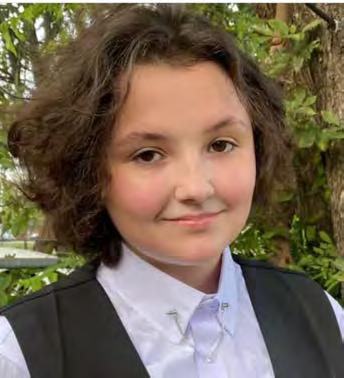
ed the incident and could constitute an assault. This remark seems to downplay the bullying Benedict experienced and the fact that they were attacked during the incident.
Benedict died February 8, the day after the fight. Owasso police say that while the cause of death is so far undetermined, preliminary findings show it was not “as a result of trauma,” according to a statement February 21.
Oklahoma has a number of anti-LGBTQ laws on its books, including one that requires students to use school restrooms that match the gender identity on their birth certificates. Oklahoma Governor Kevin Stitt and state Superintendent Ryan Walters – both Republicans – are not allies to the community by any means. Walters, in fact, appointed transphobe and online troll Chaya Raichick of Libs of TikTok to a state library advisory committee. So we know that they do not have the best interests of LGBTQ or gender-expansive students on their agenda. The rabid anti-LGBTQ views espoused by Raichick and others contributes to pervasive bullying and threats of violence against queer youth. Just this week, Media Matters reported that Raichick acknowledged in an interview that a post of hers was false but she would not take it down. (That post falsely
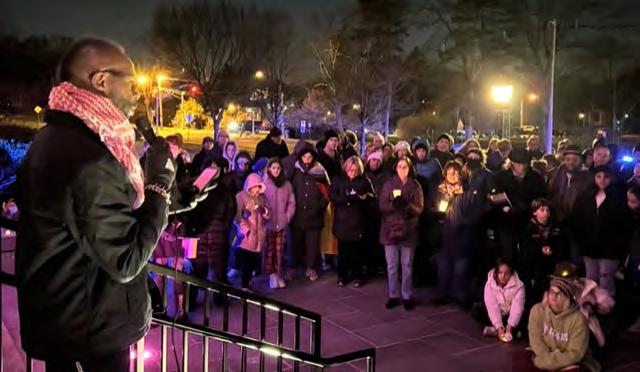
identified the shooter at the school in Uvalde, Texas as trans.)
Lambda Legal Defense and Education Fund, the American Civil Liberties Union, and the American Civil Liberties Union of Oklahoma are challenging that Oklahoma bathroom bill, which Stitt signed in 2022, in court. In September 2022, the organizations filed a federal lawsuit, Bridge v. the Oklahoma State Department of Education, on behalf of three transgender students. According to the ACLU of Oklahoma’s website, the case is pending.
Aside from the legal case, even if it is found that trauma did not play a role in Benedict’s death, the hostile climate for LGBTQ and gender-expansive students in the state is reason enough for federal intervention. Conservative Oklahoma leaders don’t seem to grasp the severity of Benedict’s death, nor, would we argue, do they want to. Indeed, when you have elected leaders describing LGBTQ people as “filth,” there is a disconnect. Benedict was a person, after all. Not an “it,” as some have referred to them.
The Tahlequah Daily Press recently reported about a town hall forum held by Republican state Senator Tom Woods. He was asked by audience member Cathy Cott, “Why does the Legislature have such an obsession with the LGBTQ citizens of Oklahoma and what people do in their personal lives and how they raise their children?”
While Woods said his “heart goes out” regarding Benedict’s death, “We are a Republican state – supermajority – in the House and Senate. I represent a constituency that doesn’t want that filth in Oklahoma. We are a religious state and we are going to fight it to keep that filth out of the state of Oklahoma because we are a Christian state – we are a moral state. We want to lower taxes and let people be able to live and work and go to the faith they choose. We are a Republican state and I’m going to vote my district, and I’m going to vote my values, and we don’t want that in the state of Oklahoma.”
Whether Woods realizes it or not, there are LGBTQ, Two-Spirit, and gender-expansive people in the Sooner State. They are constituents of elected representatives just as much as everyone else. It’s unfortunate that the state Legislature is in the firm grip of anti-LGBTQ Republicans, but a high school student’s death should be of urgent concern to all elected leaders.
At least Oklahoma Attorney General Gentner Drummond (R) issued a statement condemning the bullying and that children should not be subjected to it. Stitt issued a statement to the Washington Post echoing those sentiments.
But this type of bullying is also what happens when education officials care more about appeasing Libs of TikTok followers than students. This includes bans of LGBTQ-themed books, the misinformed belief that drag queens are out to “recruit” children, and on and on it goes. What public school students should have is the support of teachers and staff and the ability to get an education.
Garland should use the resources of the federal government to investigate Benedict’s death. This young person had their whole life ahead of them. t
Normand for E. Bay education post
Angela Normand, who is a Black lesbian, is running for reelection to the Trustee Area 2 seat on the Alameda County Board of Education. She represents communities in Alameda, and portions of San Leandro and Oakland. We recommend Normand for another term.
Normand is a statewide director for the California Teachers Association and a special education teacher. As she stated in her Bay Area Reporter candidate questionnaire, “I’ve dedicated my entire educational career to advocating for the needs of children the system overlooks: students who are targeted for who they are, not what they do; students who have special needs; have been expelled; are trapped in the court system; or are young parents.”
She explained that in her role as a trustee, she leverages relationships with Alameda County and municipalities to advocate for and coordinate programs and funding to help students affected by homelessness. There is a county Collaboration Advancing Research, Efforts, and Supports, or CARES, program that prioritizes funding for homeless education and

school counselors. “I advocate for responsible budgeting ensuring socioeconomically disadvantaged students and/or those experiencing housing insecurity receive the services they need,” Normand stated. She added that she routinely meets with state legislators and works

to ensure that teachers can afford to live in the communities they serve. She was part of the coalition that helped pass parcel taxes that led to an increase in pay for educators in the city of Alameda and supports a similar parcel tax on the March 5 ballot. (Proposition E.)
Overall, Normand is a solid choice to continue serving on the county education board, which offers support to area public school districts. Norman served for 10 years in the Marine Corps and stated that experience taught her that there is no higher calling than giving back to communities. t
Correction
The February 22 editorial, “SF DCCC recommendations,” incorrectly stated that only one out candidate in Assembly District 19 returned their questionnaire. In fact, lesbian candidate Frances Hsieh also returned her questionnaire. The online version has been updated and we regret the error.
6 • Bay area reporter • February 29-March 6, 2024 t << Open Forum
area reporter 44 Gough Street, Suite 302 San Francisco, CA 94103 415.861.5019 • www.ebar.com
BAR Media, Inc. © 2024
division of
President: Michael M. Yamashita
• scott@ebar.com Letters • letters@ebar.com Published weekly. Bay Area Reporter reserves the right to edit or reject any advertisement which the publisher believes is in poor taste or which advertises illegal items which might result in legal action against Bay Area Reporter. Ads will not be rejected solely on the basis of politics, philosophy, religion, race, age, or sexual orientation. Advertising rates available upon request. Our list of subscribers and advertisers is confidential and is not sold. The sexual orientation of advertisers, photographers, and writers published herein is neither inferred nor implied. We are not responsible for unsolicited manuscripts or artwork.
Nex Benedict
Courtesy GFM
Angela Normand
Courtesy the candidate
Stephen Chukumba, left, the father of a gender-expansive youth who was featured in the short documentary “The Dads,” spoke at a memorial for Nex Benedict in Maplewood, New Jersey on February 24.
Courtesy NJ Safe Schools Coalition
by Matthew S. Bajko
The March 5 primary will herald a leadership sea change for the San Francisco Democratic Party. Of the 24 people serving in elected seats on its oversight body, more than half have opted not to seek election this year, including transgender party chair Honey Mahogany
Peter Gallotta is the only LGBTQ incumbent on the Democratic County Central Committee, known as the D-triple-C for short, vying to remain.
Gallotta, who is queer, holds one of the 14 seats from the city’s 17th Assembly District covering the eastern section of San Francisco. The other 10 seats are allocated to the 19th Assembly District on the westside of the city.
Part of a slate of progressive DCCC candidates, Gallotta told the Bay Area Reporter he wants to remain on the committee because the local party needs to be “as bold” as the city itself.
“San Francisco is facing real challenges as we recover from the COVID-19 pandemic, but we cannot afford to revert back to failed Reagan-era policies in the hopes they suddenly deliver results,” stated Gallotta. “On the SF DCCC, I will continue to champion a San Francisco that is safe, affordable, and accountable for all. I will defend San Francisco’s Sanctuary City status, fight for more affordable housing, support investments in our public schools, and continue to support evidence-backed solutions to address the public health crisis on our streets.”
DCCC members not only determine the local party’s endorsements for ballot measures and races in San Francisco, they also select the local party chair, a powerful post that past holders of have used to run for elected office. Thus, it is seen as an influential body that can sway the outcomes of local elections because it sends out mailers featuring its endorsed candidates and stances on ballot measures to city voters ahead of each election.
Yet, the DCCC remains little known to most voters, who usually pay scant attention to the quadrennial contests for seats on it. This year, however, with the November election boding poorly for Mayor London Breed based on recent polling, the contest to control the city’s Democratic Party – and whom it ends up backing in the mayoral race –has attracted greater attention. Look no further than the television and online ads championing a number of moderate DCCC candidates as evidence of the money flowing into this year’s race.
One such candidate is Joe Sangirardi, a gay Castro resident whose ads have blanketed online sites. A vocal supporter of the renovation plans for the Castro Theatre, Sangirardi has been active in various local political and neighborhood groups.
“I care deeply about our city and believe that politicians, moderates and progressives alike, have become more occupied with soundbites and retweets than actually delivering on their promises,” Sangirardi told the B.A.R. “As an overwhelmingly Democratic city, SF’s Democratic Party can have enormous sway in determining who gets elected.
I’m running for DCCC to make sure the folks we endorse as a party are outcomes-oriented and not just interested in virtue signaling.”
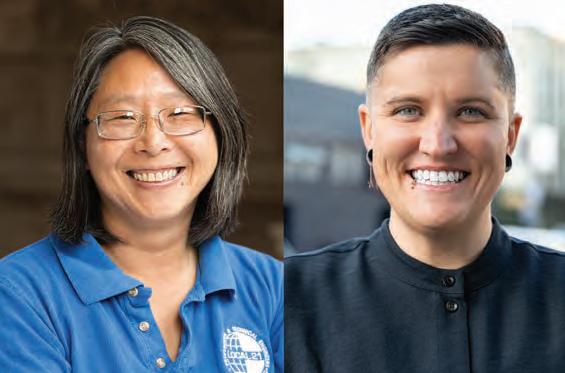
There are two main slates of candidates running on next month’s ballot, with progressives united under the banner of Labor and Working Families and moderates like Sangirardi teamed up as SF Democrats for Change. Only registered Democrats in the state Assembly districts can vote for their respective representatives on the DCCC, and they do not have to choose only members of either slate.
Part of the progressive slate is gay lawyer Michael Nguyen, who performs as drag queen Juicy Liu. He told the B.A.R. he is running to see that the local party listens to and meets “our community” where it is.
“Too often in our politics, corporate interests funnel huge sums of money to push agendas through that don’t work for everyday San Franciscans,” stated Nguyen. “As a community organizer and activist, I’m a champion for our most marginalized communities, especially for folks who don’t think their voices matter.”
Thirty people are seeking the DCCC seats designated to the 17th Assembly District, with another 21 running for those seats in Assembly District 19. The winners of both DCCC races will serve four-year terms beginning this spring, as they will be seated once the primary vote is certified. They will help elect a new party chair and determine the party’s endorsements in the fall municipal races.
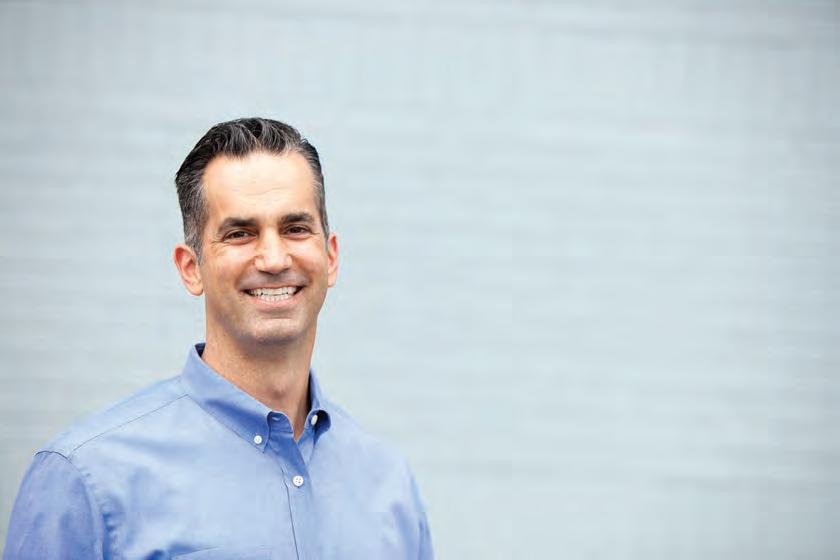
Also departing will be Campos’ successor and former aide, Supervisor Hillary Ronen, a straight ally.
Meanwhile, one of the elected officials seeking a DCCC seat in AD 17 this year is gay District 6 Supervisor Matt Dorsey, who had won a seat on it over a decade ago. During his term from 2012 and 2016, Dorsey was San Francisco’s only openly HIV+ elected official.
He told the B.A.R. elected officials are needed as DCCC members because they play an important role within the local party.
“In addition to offering the needed experience to do the fundraising, voter registration and (Get Out The Vote) work at the core of the DCCC’s mission, I think they are important for mentoring and supporting non-elected younger people as they’re gaining political experience as DCCC members,” stated Dorsey, part of the moderate slate.
Another current officeholder running for a DCCC seat in AD 17 is City College of San Francisco Trustee Vick Chung, who is pansexual and nonbinary. Part of the progressive slate, Chung told the B.A.R. they are running not only to ensure the needs of the financially struggling college are a priority for the local party but also to empower its students.

Another distinction of this year’s DCCC contest is the lack of elected city officials who are running; just six current officeholders are candidates. (The city’s Democratic congressional and state legislative elected representatives are automatically given seats on the party’s governing body, along with the statewide officeholders from San Francisco.)
In past DCCC races local elected officials have largely crowded out party activists vying on the ballot. It dented the party’s electoral farm team, as DCCC members often use their experience running the local party as a launch pad for seeking political office.
Among the 15 incumbents departing this year are eight current or former elected officials, including gay District 8 Supervisor Rafael Mandelman out BART directors Bevan Dufty and Janice Li, bi City College board member Shanell Williams, and gay former District 9 supervisor David Campos

“Besides voting to endorse, and offering to mentor and support queer, Black and brown candidates that come before the DCCC, as a continuation of the work I started as a student activist, I hope to more effectively empower student leaders – particularly queer, Black and Brown students who are rooted in ethnic and social justice studies–to engage as organizers within the system and to seed aspirations for them to run for office,” stated Chung. “If elected, I will have wider and greater political influence to uplift these students into decision-making bodies across the city and state.”
Fourteen LGBTQ candidates for DCCC seats responded to the B.A.R.’s questionnaire for the candidates this year. They predominantly are men and all are running as part of one of the two slates. The sole lesbian, Frances Hsieh had previously served on the DCCC and is now running as one of the progressive slate members in AD 19.
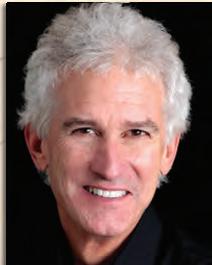

Planning Ahead is Simple
Planning Ahead is Simple
The benefits are immense.
The benefits are immense.
When you plan your life celebration and lasting remembrance in advance, you can design every detail of your own unique memorial and provide your loved ones with true peace of mind. Planning ahead protects your loved ones from unnecessary stress and financial burden, allowing them to focus on what will matter most at that time—you. Contact us today about the beautiful ways to create a lasting legacy at the
When you plan your life celebration and lasting remembrance in advance, you can design every detail of your own unique memorial and provide your loved ones with true peace of
about the beautiful ways to create a lasting legacy at the
t
>>
Politics
San Francisco Columbarium.
1306 / COA 660
Loraine Ct. | San Francisco | 415-771-0717
Proudly serving the LGBT Community. FD
One
SanFranciscoColumbarium.com
mind. Planning ahead protects your loved ones from unnecessary stress and financial burden, allowing them to focus on what will matter most at that time—you. Contact us today about the beautiful ways to create a lasting legacy at the San Francisco Columbarium. Proudly serving the LGBT Community.
Ahead is
The benefits are immense.
you plan your life celebration and lasting remembrance in advance, you can design every detail of your own unique memorial and provide your loved ones with true peace of mind. Planning ahead protects your loved ones from unnecessary stress and financial burden, allowing them to focus on what will matter most
FD 1306 / COA 660 One Loraine Ct. | San Francisco | 415-771-0717 SanFranciscoColumbarium.com Barry Schneider Attorney at Law •Divorce w/emphasis on Real Estate & Business Divisions •Domestic Partnerships, Support & Custody •Probate and Wills www.SchneiderLawSF.com 415-781-6500 *Certified by the California State Bar family law specialist* 315 Montgomery St , Ste. 1025, San Francisco, CA 94104 The Scott W. Wazlowski Vice President of Advertising advertising@ebar.com 44 Gough Street #302, San Francisco, CA 94103 (415) 829-8937 • www.ebar.com Advertise! Election to bring changes to SF Democratic Party Letters >> Vote no on CA Prop 1 I am writing to urge the queer community to vote no on Proposition 1. Our state needs real solutions –and increased resources – for the homelessness and housing crises. Despite its many promises, Prop 1 does not increase funding for services and is not a solution to homelessness. It would cut existing, lifesaving, community-based mental health services, many of which prevent homelessness. Many effective programs that provide recoveryoriented support to Californians with mental health issues – often delivered by peers with similar experiences – are now funded through the Mental Health Services Act, including services by and for LGBTQ+ communities who have historically been poorly served or outright harmed by the mental health system. American Civil Liberties Union organizations across the state, the League of Women Voters of California, Disability Rights California, and many others oppose this proposition. Please vote no on Prop 1. Sarah Marxer San Leandro, California See page 8 >>
Planning
Simple
When
at that time—you. Contact us today
San Francisco Columbarium. Proudly serving our Community.
Out San Francisco DCCC candidates include Frances Hsieh, left, and Sydney Simpson.
Courtesy the candidates
Support.
This is what it takes to take on Alzheimer’s.
It’s not easy to accept that nearly two-thirds of people diagnosed with Alzheimer’s are women. Or that some cases may be diagnosed as early as age 55. But we can learn about signs and reduce our risk by staying active and lowering blood pressure.
Because we have what it takes to take on Alzheimer’s.
Learn about signs and screening at TakeOnALZ.com
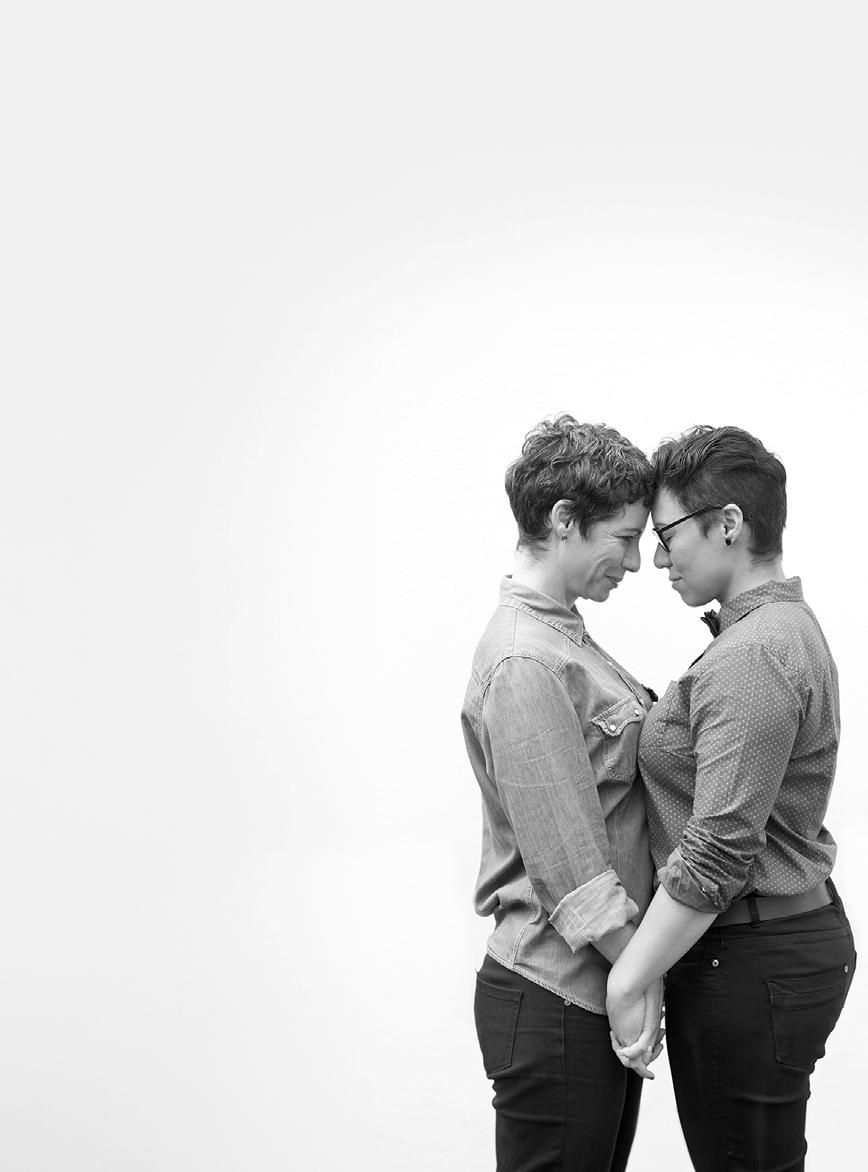
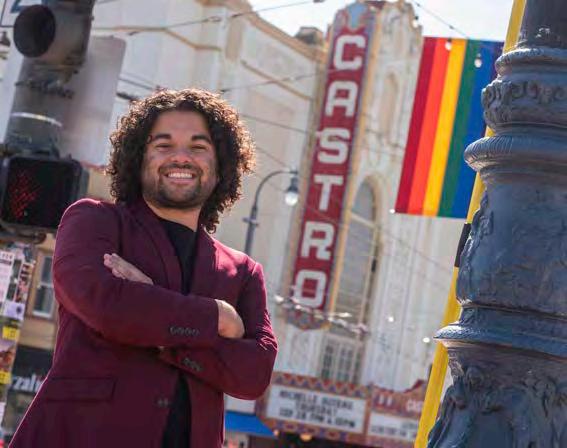
<< Political Notebook
“I have spent much of the past 20 years volunteering and working for progressive causes and candidates, demonstrating, through action, my commitment to the work of the party,” noted Hsieh. “I am running as part of the Labor and Working Families slate because I know that each one of my slate mates shares that vision and commitment.”
Among the slate’s out candidates in AD 17 is Joshua Rudy Ochoa, who is bisexual and queer. Having turned 25 in January, he is the youngest candidate for DCCC this year.
“We have too much at stake with corporations and special interests drowning our local elections in money to take control, and to elect candidates who will be more favorable to their demands,” stated Ochoa. “We need a San Francisco Democratic Party that fights for working people and kitchen table issues.”
Gay longtime union leader Sal Rosselli is also one of the progressive slate members running in AD 17. He told the B.A.R. he is doing so to enact “real change” in the city.

I vote for my family.
“My vision for SF is a city where affordable housing, job security, and safe neighborhoods aren’t just ideals, but realities,” stated Rosselli.
Fellow AD 17 slate member Jeremy Lee, a gay man who served on the city’s redistricting task force in 2021, noted to the B.A.R. how he had “advocated heavily” to “keep whole” the city’s 8th supervisorial district that includes the LGBTQ Castro neighborhood. Lee added that he “staked my reputation to call out the injustices caused by breaking apart marginalized communities across the city, especially the Trans Cultural District,” which was drawn into a newly configured District 5 with the Haight and only a small slice of its boundary kept in the new District 6.
Lee told the B.A.R. he is now running for the DCCC “to uplift the needs of underserved communities, speak truth to power, and call out do-nothing policies that put quick wins and political clout over real solutions. If elected to the SFDCCC, I will be a fierce voice for immigrants, LGBTQ people, and working families.”
Also part of the progressive slate in AD 17 is queer married parent Sydney Simpson, a nurse who founded and leads the Harvey Milk LGBTQ Democratic Club’s Trans Caucus.
“As a slate, we hope to more effectively
<< Latino community
From page 2
The mayor’s housing office did not return a request for comment.
Morales told the B.A.R. that AGUILAS was originally going to lose all of its city funding. The cut came after DPH decided to award the money to IFR, he said. A last-minute add-back in June 2023 from the San Francisco Board of Supervisors, after conversations with gay District 8 Supervisor Rafael Mandelman and District 9 Supervisor Hillary Ronen, prevented elimination of city funding, Morales said.
This is the 30th year AGUILAS has been in the HIV/AIDS prevention field,
empower young people, particularly queer, Black, and brown to engage as organizers within the system and to plant aspirations for them to run for office, and bring them into decision-making bodies throughout the city and state,” Simpson told the B.A.R.
Running in AD 17 as part of the moderate slate of DCCC candidates is Luis A. Zamora, one of the city’s delegates to the California Democratic Party and cochair of the party’s LGBTQ+ Caucus. He now wants to play more of a role locally.
“If elected, I will continue to champion efforts to further support and advance our community, and fight back against anti-LGBTQ efforts in our nation through organizing efforts like phone banking and supporting candidates who support our community,” Zamora told the B.A.R.
Fellow slate member from AD 17, Emma Heiken, who told the B.A.R. her sexuality is fluid, wants to bring to the local party committee her experience working at City Hall as a legislative aide to District 7 Supervisor Myrna Melgar
“In addition to my career in public service, I have personal experiences that represent some of the challenges facing San Franciscans: my mother struggled with addiction, my cousin was forced into homelessness due to transgender housing discrimination, and my life has been deeply impacted by gun violence,” stated Heiken.
Trevor Chandler, a gay man running for the District 9 supervisor seat in November, first has his sights on being elected to the DCCC. He is one of the moderate slate’s AD 17 candidates. “I commit to using my role on the DCCC to build and advance the next generation of leadership in the Democratic Party,” pledged Chandler.
Among the moderate slate’s AD 19 candidates is Mike Chen, a gay man who fell short when he ran for DCCC four years ago. Chen told the B.A.R. he would prioritize the party’s nuts and bolts work, such as voter education and turnout, should he be elected this year.
“I think the DCCC could help people understand how local government works, and help more people become invested in civic life through neighborhood associations, Democratic Clubs, city commissions, and other organizations. Putting more people in civic leadership should build the bench for elected office,” stated Chen. “How do we show that civics matters and that people have political power (self-efficacy)?” t
Morales said. (He added that the organization was founded in 1991, but the first three years were focused on political activities.) The organization had to cut staff and services.
“The services have been reduced,”
Morales said. “We can’t do $400,000 [worth] of services with only $200,000. It just doesn’t cut it. So we had to let go of staff – we went from 11 to six and all of us are part time. … What we had to knock out were the monthly social events, our major way of recruiting people and building community … and providing HIV testing when we had our grant with the health department.
See page 10
8 • Bay area reporter • February 29-March 6, 2024 t
<< Community News City Hall, Room 48 (415) 554-4375 sfvote@sfgov.org sfelections.org Register now and vote in March 5, 2024 Election. sfelections.org/register
7
From page
Out DCCC candidate Joshua Rudy Ochoa
Courtesy the candidate
>>
Changes in Cuba signal welcome for LGBTQ visitors
by Ed Walsh
If you haven’t been to Cuba recently you haven’t been there. The country is quietly tiptoeing away from the socialism that has impoverished the island since Fidel Castro confiscated private property and businesses in 1960, prompting the U.S. trade embargo in 1962. The Cuban government says the embargo is to blame for most of its economic troubles but critics, while acknowledging that the embargo has a significant economic detriment, say it is too often used as a catchall excuse for the government’s failings.
In 2011, then-president Raul Castro gave the green light for the establishment of small businesses. That program was expanded in 2021 to allow businesses to operate with up to 100 employees. The CIA estimated in 2021 that 27.7% of Cubans were employed in the non-state sector. Since 2021, more than 8,000 new private sector businesses have been created, according to the University of Miami. Now some estimates put non-state sector employment to as high as 35%.
Years before Cuba began its shift away from socialism, the country turned away from homophobia. That change was made clear less than two years ago when nearly two-thirds of the Cuban population voted in support of samesex marriage and the right for same-sex couples to adopt children. That was a huge change for a country that once imprisoned homosexuals.
Confusion
about visiting Cuba
There is a lot of confusion about visiting Cuba. Most of what you read on the internet is outdated. Americans are allowed to visit Cuba as long as they check off one of 13 boxes stating that they are going to the country for a number of mostly humanitarian reasons. Most people check off the box that says they’re going in support of the Cuban people, a rule that is loosely interpreted and rarely verified or enforced.




I visited Cuba last month with copious advice from Charles Kimball, a Healdsburg resident and hotel maître who runs the LGBTQ-focused website Out in Cuba. (https://www.outincuba. co/) He said that none of his clients have ever been questioned when they check off that box. He noted that he only puts travelers in small privately-owned bed
and breakfast inns known as casa particulares. By staying there, his clients can directly support LGBTQ-friendly local Cubans instead of the repressive Cuban government, which has at least a majority ownership of almost all large hotels and resorts. Kimball works with a couple of great guides in tune with Cuba’s gay community, Andrés Gómez Quevedo and Dayron Ortiz.
Forty-eight hours before your flight departs, you should fill out this form online – https://dviajeros.mitrans.gob. cu/inicio – so you don’t have to deal with it when you arrive. It is in Spanish, so you will need a translation app if you don’t know the language. After you complete the form, you will be given a QR code, which you can download on your phone or print out. You will need to show that code when arriving in Cuba.
But wait, there’s more. You will also need to buy a visa, which you can purchase at the gate if you connect in Miami. You can also buy it online but it usually costs more to do so. All the airlines charge different prices for the visa. JetBlue, for example, charges half of the $100 American Airlines does.
Accommodations
tion a little farther away from the main tourist attractions in the city. It is just a 15-minute taxi ride from the heart of historic, but noisy, Old Havana.

There are two gay hotels in Cuba and both are banned for U.S. travelers, though that prohibition is apparently very loosely enforced. Bans aside, you may want to avoid either hotel because by staying there, you are effectively providing support for the Cuban military, which profits from the hotels through its tourism company, Gaviota. According to the U.S. State Department, more than 700 people were arrested for protesting against the Cuban government in 2021. Some were charged with sedition, facing prison sentences of up to 26 years.
I stayed at the Casa Cuarteles on my trip on a referral from Out in Cuba. It is a beautifully restored building in the heart of old Havana and in easy walking distance of the city’s main attractions. The property is staffed 24 hours a day, so there always is someone around to help. That is a huge advantage in a country that can be quite confusing. I was able to tour a couple of nearby gay-owned places that would be great choices as well. If you search for Baywinds in Havana Airbnb listings, you will find a one-bedroom apartment rental from Cuban native Amaury Pascual. Like Cuarteles, it is perfectly situated in Old Havana, within walking distance of the most popular attractions in the city.
Another good gay-owned option is the seven-unit Casa Vitrales that includes two suites and five standard rooms. It is owned by Osmani Hernandez, who can clue you in on Havana’s gay scene. For the noise-sensitive, the gayowned Casa Flamboyan is a great op-
The Telegrafo Hotel, in the heart of Havana, is the oldest hotel in Cuba but it reopened in 2022 under the Spanish-based LGBTQ Axel Hotel brand. Like the other hotels in the Axel brand, it promotes itself as “hetero-friendly.” Despite the State Department’s ban, on a recent tour of the 63room property, I was told that the hotel is popular with Americans.
The other gay hotel, Hotel Gran Muthu Rainbow, was opened by Cayo Guillermo in 2019 but it is also on the banned list because of its partnership with the Cuban military. The hotel is in a resort area, a seven-hour drive from Havana or about a 35-minute cab ride from the Aeropuerto de Jardines del Rey.
Money Cuba once used a tourist currency and a currency for residents. Now, it’s all the same currency. Inflation has been astronomical in Cuba. As of January 2024, a 500-peso note was worth just two U.S. dollars. Most private businesses accept U.S. dollars, but it is usually a good idea to convert your money to pesos rather than trust a store or res-

February 29-March 6, 2024 • Bay area reporter • 9 t OUR COMMITMENT TO YOU UCSF is deeply committed to providing care for LGBTQ+ people and their families that isn’t just equitable as crucial as equity is. We’re committed to giving you care that’s warm, welcoming, and knowledgeable, too. That’s why we’re a longtime Equality Leader in HRC’s Healthcare Equality Index and why we offer a uniquely wide range of support for our LGBTQ+ patients and employees. We look forward to warmly welcoming you and offering the great, supportive care that you and your family deserve. ucsfhealth.org/lgbtq-care
Travel>>
The Christ of Havana statue overlooks the Cuban city.
Ed Walsh
Casa Vitrales owner Osmani Hernandez, left, and manager Alejandro del Pino can fill visitors in on the gay scene.
Ed Walsh
11 >>
See page
One of two fulltime gay bars in Havana is the Las Vegas
Ed Walsh
“We also had a grant with the [state] AIDS office – $250,000 for three years –which also ended in June 2023, and we still have a grant with ViiV Healthcare to do leadership development,” he added.
That leadership development grant totals $91,000 per year but ends May 9, Morales said, though he added ViiV just sent a call for proposal requests at the end of January for the next four years.
Gustavo Ordonez, a gay man who is a program manager with AGUILAS, told the B.A.R. that the money funds on-site testing and training programs.
Bithiah Lafontant, MPH, the director of corporate communications for ViiV, stated to the B.A.R., “We are proud to have been able to provide funding to AGUILAS as part of ViiV Healthcare’s Positive Action for Latinx Men grant program, an initiative designed to support organizations across the U.S. and Puerto Rico in creating solutions to address HIV for Latinx bisexual, gay, and trans men.”
“The ViiV Healthcare award supports AGUILAS’ leadership development program for Latinx gay, bisexual, and trans men through local advocacy training and networking in English, Spanish, and Portuguese,” she continued. “Topics vary from sexual health to general skill building such as preparing taxes or how to develop a business. AGUILAS’ work is critical as they address the broad social determinants that impact health and HIV, including ensuring that immigrants have access to vital resources to promote their health.”
Ordonez said the grant funds “our HIV and STI projects, which besides providing HIV and STI testing, also we provide a training program so our members are prepared for the outside world.”
Ordonez said that over the past three decades there’ve been over 1,000 members of AGUILAS; there are “about 250” as of now.
People interested in participating in the training programs – which cover basic financial knowledge, efficient communication tools, legal awareness, and advocacy strategies – can sign up on its website.
AGUILAS’ most recent IRS Form 990, for the 2022 calendar year, shows it took in $793,764 in 2022 and spent $907,249, for a deficit of $113,485. In 2021, it took in $759,800 and spent $890,517, for a deficit of $130,717. Morales made $156,034 in reportable compensation, plus $30,456 in “other compensation from the organization and related organizations.”
Cultural competence
A common refrain from HIV prevention workers and advocates was the need for cultural competence, which they said may be a reason messages about available services aren’t getting through.
Ordonez said that “just because you translate a program into a language doesn’t mean it’s focused on that community.”
In other words, several people interviewed for this story said materials should be translated in a more culturally appropriate way, not just translated directly from English to Spanish.
“Most of our community members don’t feel the programs are made for them,” Ordonez said. “They are just translated into a language. You have to talk like them and talk to them, so they are not afraid.”
Jorge Zepeda, a straight ally who has been the Latino services manager with the AIDS foundation since 1999, told the B.A.R. that “we need better work with community-based organizations and the

dignity
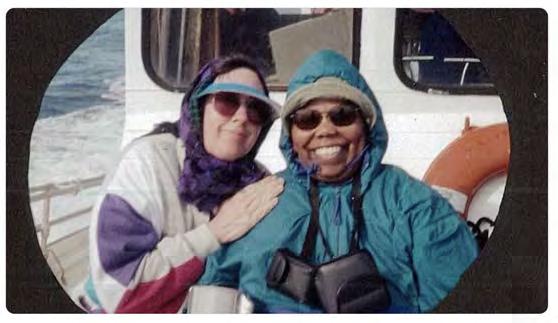

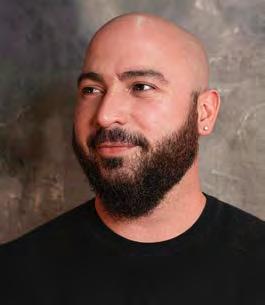
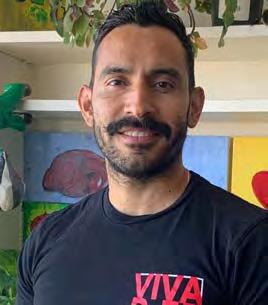
city in setting up services and creating an environment for the most vulnerable.”
He also agreed on the need for funding, especially for “community-based organizations where we have the key” to success, he said.
The AIDS foundation is the city’s largest HIV/AIDS service organization.
Tyler TerMeer, Ph.D., a gay Black man living with HIV, is the AIDS foundation’s CEO.
He stated to the B.A.R. that it has a budget of $48 million and it serves 27,000 people.
“SFAF has been providing services to the Latinx community for over 40 years through El Grupo, our Programa Latino/Latine Health Team, and services offered at Strut,” he stated, referring to the health center in the LGBTQ Castro neighborhood.
“We partner with the SF Latino Task Force, a collaboration of 40 agencies, to ensure a community network of access and referral. Additionally, through the SFDPHfunded Latinx Health Access Point we partner with IFR and Mission Neighborhood Health Center to extend services to this same community,” he added.
Representatives from the Latino Task Force did not respond to a request for comment.
Asked if the AIDS foundation can pick up the slack if AGUILAS closes, TerMeer stated, “SFAF will work with AGUILAS and our network of community partners to inform clients about what services are available and to ensure that clients are connected to existing organizations providing support to the Latinx community.”
Zepeda said that the AIDS foundation offers services in English, Spanish, and Tagalog. It also runs its Programa Latino/ Latine Individual Services, which is available regardless of immigration status and has drop-in hours at Strut.
This will be moving soon, however, as the foundation will relocate its Market Street headquarters to 940 Howard Street in the city’s South of Market neighborhood, as the B.A.R. previously reported.
“We are halfway done with our tenant improvements in the new Howard Street space and remain on track to open programs and services in that space this spring,” TerMeer stated February 16.
Programa Latino/Latine has been longrunning – its progenitor, El Grupo, was started 42 years ago by Fernando Castillo.
Zepeda said that even at the Magnet sexual health clinic at Strut, “we have a robust team of bilingual professionals.”
“We have everything set up for bilingual and monolingual community members – HIV, substance use, counseling, PrEP,” he said. “With Strut, 25% of the participants are Latine.”
In Latin America, “Latine” has been lifted up as an alternative to “Latinx” as a gender-neutral alternative to Latino. “Latinx” has been criticized in part because the Spanish language does not have an “x” suffix.
PrEP refers to the use of antiviral drugs to prevent people exposed to HIV from becoming infected. The pill Truvada was
first approved for PrEP use in 2012 by the U.S. Food and Drug Administration; since then the FDA has also approved the pill Descovy for some groups, and the drug Apretude as an injectable treatment. Studies have consistently shown disparities of PrEP use among people of color, as the B.A.R. has reported.
IFR
IFR received $2,180,171 for the health access point, or HAP, about half of which went to its contract supporting partners, which are the Mission health center and the AIDS foundation, stated Esperanza Macias, a Latina lesbian who is IFR’s development and strategic communications director.
Health access points were started by the city in 2022 as a means to address health disparities. The San Francisco Community Health Center has an access point at Trans Thrive, 1460 Pine Street, focusing on trans women, and the AIDS foundation has one at Magnet at the Strut building, 470 Castro Street. An access point for youth is at the LYRIC site at 566 Castro Street. When asked about the Latino community and HIV prevention, IFR’s Rivera said, “I would say the need the Latino community has is not just HIV; it is related to HIV. They come because they need linkage, legal support, different services; because the needs are high.”
Rivera stated to the B.A.R. that his Sí a la Vida program is one of seven at the institute.
“Sí a la Vida has continued to support the Latinx community, including providing diverse and evolving education and outreach on prevention strategies throughout the years,” he stated. “We provide direct services to approximately 500 individuals per year.”
These services include therapy, counseling, and clinical case management. IFR also provides testing for both HIV and hepatitis C.
“One of Sí a la Vida’s greatest contributions to HIV prevention is to address this issue in a way that mainstream services cannot,” Rivera stated. “Sí a la Vida also has a strong prevention and wellness team that provides support groups, individual risk and reduction counseling, case management services, and health education services.
“This grouping of services offers a continuum of support that allows our team to implement a harm reduction and trauma-informed approach within a culturally and queer-friendly approach,” he added.
While the city’s 2022 HIV report is disappointing, Rivera is not surprised.
“We know there has been an influx of Latinx immigrants into San Francisco, and with limited access to health information, our numbers are not at all surprising,” he stated.
“We are currently working on a project with our collaborative partners with the support of SFDPH to create a linkage-to-care hub that will support all psychological, sexual and health needs of the participants. The clients will receive
rapid syphilis, Hep C, HIV, and STI testing,” he stated, referring to sexually transmitted infections.
“They would also receive linkage to gain access to health insurance, harm reduction counseling, health education, and referrals for mental health, all in one place, which would be in the Latino Wellness Center,” he continued, referring to IFR’s space at 1663 Mission Street, where the health access point is also located.
Claudia Cabrera, program director of the access point for IFR and program director of Sí a la Vida, stated to the B.A.R. that “our work is not yet done.”
“The increase in HIV cases among Latinxs is the consequence of many psychosocial factors that afflict the Latinx LGBTQ community, including stigma, poverty, lack of mental health services, anti-immigration sentiments, and barriers associated with systemic oppression,” Cabrera stated. “HIV prevention efforts won’t be good enough if those factors are not addressed together.”
When asked how many clients the access point has seen, Macias stated, “It’s a complex question to answer.”
“There are #s of people tested for HIV, #s of people who receive clinical case management, mental health support, linkages and referrals, support groups, etc.,” Macias wrote in an email.
Rivera explained that IFR is aware that sexual health pertains to all communities.
“Which is why we are currently focusing on the entire Latinx community to promote sexual health awareness and education as well as reduce the stigma that has been long standing in our communities,” he stated. “We hope that this project will succeed and that the prevention and wellness portion of this project supports us in the reduction of HIV+ statuses.”
According to its most recent publicly available IRS Form 990 , IFR had a total revenue of $15.4 million in 2022 and expenses of $14.3 million.
DPH responds
DPH stated via a spokesperson that its decision to have a model based on health access points was “the result of an extensive stakeholder engagement process.”
“The Latinx HAP, located at the Latino Wellness Center, is led by the Instituto Familiar de la Raza, along with the Mission Neighborhood Health Center and SF AIDS Foundation. Staff at the Latinx HAP are diverse, bilingual and bicultural. All Latinx HAP program activities are delivered in Spanish and the educational materials they produce are created with the maximum intent to reach the affected population. The FY 23-24 Latinx HAP funding is $2.1 million,” the spokesperson stated.
“In addition to the HAPs, we are focused on strengthening our relationships with community-based organizations. For example, we are partnering with the Latino Task Force and UCSF on their efforts to provide HIV and STI
See page 11 >>
10 • Bay area reporter • February 29-March 6, 2024 t << Health News
you looking for a spiritual experience as unique as you? Come and see Dignity/SF, which affirms and supports LGBTQ+ folks. Catholic liturgy Sundays at 5pm, 1329 7th Avenue (Immediately off the N Judah line)
Are
| san francisco Come for the service and stay for the fellowship. dignitysf@gmail.com for more details Instagram @dignitysanfrancisco † Facebook @DignitySF We Want To Buy Our Apartment And Avoid Eviction, organized by Jeanine Reisbig Seniors Jeanine, Age 72, and Gale, Age 75, would love to stay in the apartment they’ve lived in for 43 years. Please donate to their GoFundMe page so they can buy their apartment and continue living there. Note: any amount will help. If you don’t have much money, even small donations are great!!! The cost of real estate in San Francisco is pretty high, hence the $300,000.00 goal. If you are not comfortable making an online donation, you can snail mail your donation to: Jeanine Reisbig, 584 Castro St. #231. San Francisco CA 94114. Please make out your check to Jeanine Reisbig. www.gofundme.com/f/we-want-to-buy-our-apartment-and-avoid-eviction Resources for the Latino community AGUILAS is located at the San Francisco LGBT Community Center, 1800 Market Street, fourth floor. Hours are 1 to 5:30 p.m., Monday through Friday. For more information, go to sfaguilas. org/la-academia. Instituto Familiar de la Raza is located at 1663 Mission Street. It has a support group on Thursdays from 3 to 5 p.m. For more information and other programs, visit ifrsf.org The Latino Access Center is located at 1663 Mission Street, Suite No. 603. Hours are Mondays and Wednesdays from 10 a.m. to 8 p.m., and Tuesdays, Thursdays, and Fridays from 10 a.m. to 6 p.m. San Francisco AIDS Foundation’s Programa Latino Individual Services is available regardless of immigration status and has drop-in hours for new members Monday through Friday from 2:30 p.m. to 4:30 p.m. at Strut, 470 Castro Street. For more information about SFAF’s programs, go to sfaf.org SFAF’s El Grupo program meets at 3 p.m. Thursdays at the foundation’s headquarters at 1035 Market Street. (Will move to 940 Howard Street this spring.)
<< Latino community From page 8
Gustavo Ordonez
Courtesy Gustavo Ordonez
Eduardo Morales, Ph.D.
Courtesy Eduardo Morales, Ph.D.
Jeremias Rivera
From LinkedIn














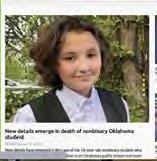

ambitious, thrilling world premiere at A.C.T.
Kevin Berne
Mission Statement 2017 Media Kit 0 a NEWSLETTERS-STRIP-BlueLena.indd 1 2/26/24 5:18 PM See page 15 >> See page 14 >>
Left to Right: BD Wong, Michael Phillis, and Gabriel Brown in the world premiere of Kate Attwell’s ‘Big Data.’
An
‘Big Data’s a big deal
The Los Angeles Blade covers Los Angeles and California news, politics, opinion, arts and entertainment and features national and international coverage from the Blade’s award-winning reporting team. Be part of this exciting publication serving LGBT Los Angeles from the team behind the Washington Blade, the nation’s first LGBT newspaper. From the freeway to the Beltway we’ve got you covered.
Kayla Farrish’s ‘Put Away the Fire, dear’
by Cornelius Washington
In San Francisco, the city often used as a setting in film noir, a new reinterpretation of Black people in cinema will be explored in Kayla Farrish’s “Put Away the Fire, dear,” an eveninglength work that addresses the evil endeavors of casting people of color for the silver screen.
Every person of color is well aware that the world of cinema is where you go to get your stereotypes reinforced and/or created, with all of the tools of idealization put into full effect to do so.
The sad, twisted fact being that sometimes people of color sign up for it.
Look at any of the films of the odious director/producer, Tyler Perry, and the recently failed musical remake of the movie, “The Color Purple.”
There has been progress in diversity and inclusion in casting, to great acclaim and profits. However, the viewpoint still exists of what is best and sterling in “classic” cinema and “Old Hollywood.” Within those two genres are the disgusting roles of the buck, the coon, the mammy, and the tragic mulatto. The movies that embrace these pathologies for the planet to see are a great disservice to artists, technicians, laborers and humanity.
Premiering at ODC Theater March 8-10, Farrish’s work combines film, dance, and original sound design to create political and social scrutiny of the depiction of African-Americans.
Farrish, an accomplished New York City-based dancer and director, and the creator of Decent Structures Arts, has been hailed by The New York Times and recognized by Dance Mag-
<< Big Data
From page 13
reside in their own apartments, but –per set and script– they live together on the shared plane of the internet,


azine as one of the top screen dance makers to watch.
In the performance, a Black woman contrasts her archetype of disappearance, with potent will and grit. She unearths a journey of quaking history, through a fantastical play of unimagined roles, unbelievable love and compassion, and a power to take back the narrative.
As Farrish says of the work, “Against
a place that remains all-too neutral, clean and slippery as experience becomes intangible. Memories are vaporized and uploaded into a manipulative algorithm rather than accreting to anchor a persistent sense of self.
an inherited history of erasure as a Black American woman from the South, I take my lens and radical dreaming as weapons of resistance, creating an immersive eye through this live film to witness time-hopping, from my grandmother’s perspective on the farm, to a trauma house where I imagine beyond its window views, to expanding onto grand stages and fantastical plots of American cinema where I’ve never existed.”
These contrasting sets –and the contrasting worldviews of the alltoo-human characters who populate them– are defined with crisp efficiency by both Attwell’s script and MacKinnon’s production.
Big time
Accompanied by pianist/percussionist Alex MacKinnon, “Put Away the Fire, dear” recasts the ugly archetypes of the 1930s through the 1960s, most notably the stereotype of the hard-boiled, snarky, world-weary detective as a romantic lead, and the glamorous, mysterious but desperate femme fatale, along with trite screwball comedies and musicals, to destroy antiquated mindsets and stereotypes
out our days. (Attwell’s single initial points to Mephistopheles).
concerning the reality of modernity, rigor, focus, subtext and style.
The six dancers re-inhabit the tropefilled roles with a new perspective.t
‘Put Away the Fire, dear,’ March 8 & 9, 7:30pm. March 10, 5pm (ASL interpretation), at ODC Theater, 3153 17th St. Free, $24-$104. odc.dance/putawaythefiredear www.kaylafarrish.com
to moment that you’re able to overlook a significant glitch in Attwell’s broadly inquisitive, admirably ambitious script.
What M is meant to personify remains a bit fuzzy. Attwell is trying to pin down a cloud.




 MUSIC &
BY WILLIAM FINN
BOOK BY WILLIAM FINN & JAMES LAPINE
DIRECTED BY DeNNIS LICKTEIG
MUSIC &
BY WILLIAM FINN
BOOK BY WILLIAM FINN & JAMES LAPINE
DIRECTED BY DeNNIS LICKTEIG

www.42ndstmoon.org
But “Big Data” was written with bigger goals in mind. In addition to tracing the fault lines of an unnerving existential generation gap, Attwell ambitiously tries to pin down the essence of life lived online.
To do so, she has written M, the play’s non-human character, a personification of the internet or the algorithm, the matrix, the AI, surveillance capitalism, or whatever else one might choose to name the whole ball of pixelated wax we interface with through-
This inherently difficult role is played with dazzling intelligence by BD Wong. In a sinister comic turn, he differentiates M from the other characters not with oracular grandness but the anachronistic rhythms of a fairground sideshow charlatan.
You watch with a combination of glee and unease as he picks the psychological pockets of the mortals around him, transforming all the valuables he retrieves into flattery, seduction, isolation, and dependence, not to mention impulsive online shopping.
In Swifty Lazar spectacles and a gloriously cartoonish plaid suit by costume designer Lydia Tanji, Wong delivers an unforgettably vivid performance, so entertaining from moment
One watches, rapt, but ultimately realizes that this central character has been written without motivation.
The humans M engages with may be turning into puppets, but he is ultimately not much more than a set of high-tech strings. The puppeteers and their goals are left offstage, unexamined and unscathed.t
‘Big Data,’ through March 10. $25$100. Toni Rembe Theatre, 415 Geary St. (415) 749-2228. www.act-sf.org

14 • Bay area reporter • February 29-March 6, 2024
t << Dance & Theater
hilarious, heartbreaking and utterly unique FEBRUARY 29-MARCH 17
GATEWAY THEATRE • 215 JACKSON STREET
LYRICS
Kerime Konur, left, and Kayla Farrish in ‘Put Away the Fire, dear.’
Elyse Mertz
Left to Right: Gabriel Brown, Rosie Hallett, and Michael Phillis in ‘Big Data’ Kevin Berne
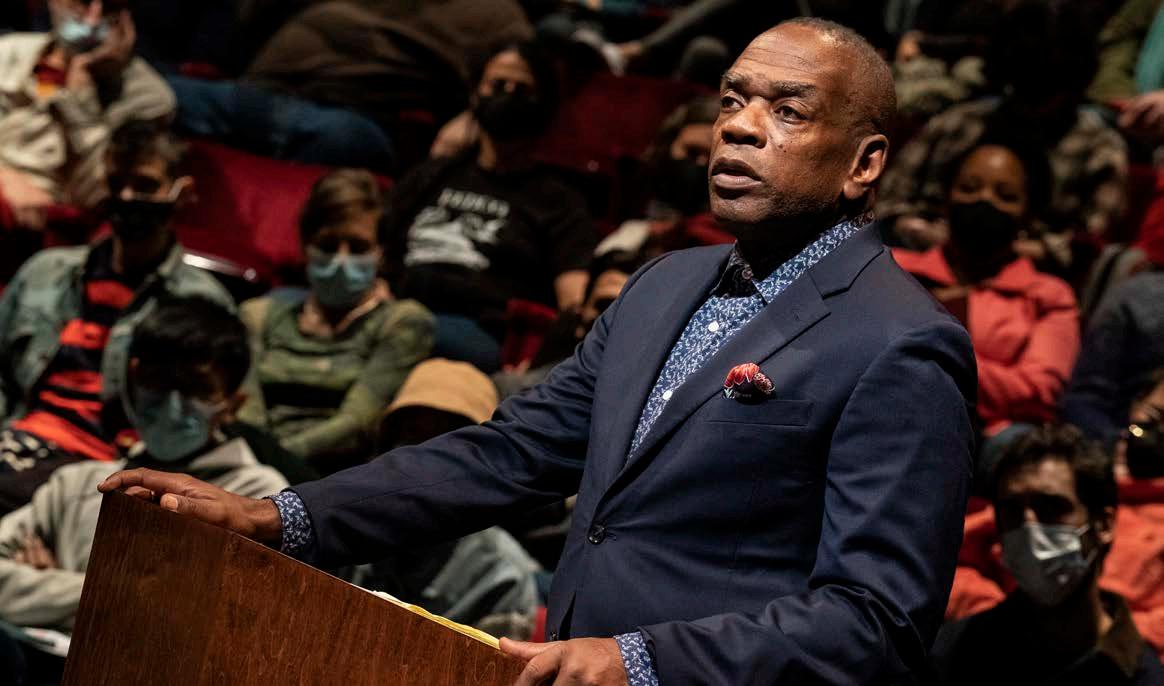
performance was very funny. But Greig and I realized that might make things a little too easy for our audi-
event. The stakes are higher and less intellectually precious than in “Gatz,” though, because both the dramatis personae and the drama itself are nonfictional.
Audiences will be provoked to consider whether the orators’ arguments feel dated or of-the-moment, and how the transposition of the debate from the U.K. to the U.S. alters its energy.
To further complicate matters –which is Elevator Repair Service’s dizzyingly multivalent modus operandi– Greig Sargeant suggested in a recent interview with the Bay Area Reporter that he is not exactly acting in “Baldwin and Buckley.”
“Long before I worked on this piece, Baldwin’s words have given my life meaning and a voice. So, every single part of me is integrated into this.”
“I’m speaking to people and I’m delivering a message hoping that it will invoke some sort of conversation about what we should do as a society in the future,” he added. “So, yes, it is billed as a performance but it’s not really a performance.”
In the same interview session, John Collins, the founder and Artistic Director of Elevator Repair Service, said, “We want Baldwin and Buckley to exist through their words. Greig can exist through his body. It’s just a weird sort of liminal space we’re trying to slide into.
“We’re triangulating the identities of Greig Sargeant and James Baldwin and the words themselves. I enjoy these things being in tension with each other. That tension creates a kind of vitality.”
Words first As part of their effort to train audience attention on the words spoken by the debaters, Collins and Sargeant have opted to tamp down some of the more performative elements of William F. Buckley’s public persona.
Playing the founder of The National Review, Scott Shepherd holds back a bit on Buckley’s languorous, condescending drawl, letting his ideas be heard more than his vocal mannerisms, which could easily support his being perceived as a buffoon by today’s audiences.
“The actor who played Buckley when we first did this piece, did an absolutely brilliant impression of him,” said Collins. “Buckley was something of a character and the
ence, because it makes it simpler to dismiss him as a sort of a joke.
“We want audiences to listen seri-
ously to the arguments he makes,” he continued, “because he was making them seriously, and it’s important to
hear where these ideas are coming from. We want you to come down on the side of Baldwin, but we want him to have a good intellectual challenge and to rise to it. Which he does. The Cambridge students vote Baldwin the winner of the debate.”
Sargeant and Collins concede that there’s an element of preaching to the converted when presenting “Baldwin and Buckley at Cambridge.”
“The people who consume this kind of culture,” acknowledged Collins, “tend to be more liberal. It can feel frustrating, like the Venn diagram is just a big circle. I sometimes wish we could reach a greater diversity of people.”
That said, the production concludes with a coda to the debate that Sargeant has crafted. It’s a dialogue scene between Baldwin and his friend, Lorraine Hansberry (Daphne Gaines), who challenges Baldwin to think carefully about the validation he receives from white liberals.
“Hopefully,” said Collins, “The show will teach something valuable to some of the people who assume they’re already the converted.” t
“Baldwin and Buckley at Cambridge,” March 1, 8pm; March 2, 2pm & 8pm; March 3, 2pm & 7pm. $82. Zellerbach Playhouse, 2413 Bancroft Way, Berkeley. (510) 6429988. www.calperformances.org

February 29-March 6, 2024 • Bay area reporter • 15 t Theater >> USE CODE DATA30 TO SAVE 30% NOW PLAYING GET TICKETS “ONE OF THE BAY AREA’S MOST PROMISING WORLD PREMIERES IN RECENT MEMORY” SAN FRANCISCO CHRONICLE HIGHEST RATING BY KATE ATTWELL DIRECTED BY PAM MACKINNON FEATURING BD WONG
<< Baldwin & Buckley From page 13
BD Wong and Gabriel Brown, photo by Kevin Berne.
Greig Sargeant in ‘Baldwin and Buckley at Cambridge’
Martha Swope
Russ Lorenson
by David-Elijah Nahmod
Russ Lorenson is an old-fashioned crooner. A well-known cabaret artist, his style is very much in the vein of Tony Bennett and other singers of the Great American Songbook.
Lorenson’s voice is smooth, cool, and quite pleasing to the ear. Over the years he has enjoyed a prolific career in musical theater as well as building up a strong following in clubs.
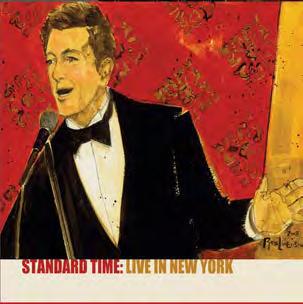
He has performed extensively in New York and in his former home, San Francisco.
In 2021, Lorenson’s performing career came to a screeching halt when he was diagnosed with HPV-positive tonsil cancer. He endured surgery, chemotherapy and radiation and is now cancer-free. But there was a tragic after effect to his illness; he lost his ability to sing.
Undaunted, he has released a new album anyway. “Standard Time: Live in New York” is a live album, recorded at the Metropolitan Room in New York City in October 2008. It’s his fourth album, and likely his last.
“Now I could sit around and be depressed about that,” Lorenson said in an interview with the Bay Area Reporter. “But I choose to be grateful because I survived. Plus, I realize that cancer may have stolen my ability to sing, but it hasn’t stolen my voice and
Gay singer’s new jazz album, years in the making

I still have some things to say.”
Lorenson’s immediate plans are to write a book, an origin story for the Christmas tune “Jingles, the Christmas Cat,” a song he was enchanted by when he heard Freddy Cole, Nat King Cole’s brother, perform it at Feinstein’s. His own rendition of the song can be heard on his 2015 holiday album “In the Holiday Spirit.”
“All the time I’ve known this song, I’ve always thought that Jingles should have an origin story, just like Rudolph
and Frosty,” he said. “So, I decided to write it myself. We’re aiming to have the book out in time for Christmas this year. Besides the book about Jingles, we have two others in the early stages, and I hope those will be successful.”
Lorenson has also been asked by several singers to help craft their shows and to provide direction, among other projects.
“So, I don’t think I’m done by any means,” he said.
Port Bar’s closing party
by Stephen LeBlanc
After serving as a central gathering place for Oakland’s diverse queer community for nearly nine years, the Port Bar served its last drag brunch and poured its last cocktails on February 25.
The bar opened in July 2016, after several years of planning and construction by longtime Oakland residents and life and business partners Richard Fuentes and Sean Sullivan. It was the first downtown queer bar in Oakland to be open seven days a week and served as a neighborhood bar, a casual gay bar, a DJ dance club, and became a hub of the Oakland trans community.
More than 100 people dropped by to celebrate the Port and its owners for their years of providing a safe, fun, solid space. They’re determined to continue the community spirit at their newer club, Fluid 510 (1544 Broadway) which opened in May 2023.
Resilience
Said co-owner Richard Fuentes in an interview with the Bay Area Reporter, “I feel overjoyed about the amount of people who have come out today to support the last day at The Port Bar. The bar is a community hub and we will to continue to be so, as we are moving our queer programming down the street to Fluid 510. Everybody who came to the Port Bar is welcomed and encour-
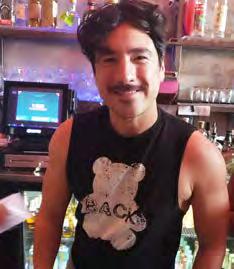
Great songs
His new album is a very simple concept, that the Great American Songbook didn’t stop being written in 1959. When he first put the show together in 2007, he decided to perform songs that had been written over the previous twenty years or so, albeit songs that were written in the Songbook style.
“I really wanted to celebrate the songwriters who are keeping the Songbook alive,” he said. “And a lot of the songs on the album were, not coincidentally, written by great singers of the classic Songbook. People like Harry Connick Jr, John Pizzarelli, Peter Cincotti, and, of course, our spiritual leader Michael Feinstein. And you know what? It wasn’t hard to find songs. The challenge was limiting the set list so that the show wasn’t four hours long.”
Lorenson is well aware that people’s listening habits have changed over the years. Most people don’t sit down and listen to an album, they pick and choose individual tracks to stream.
“So the route we took was to release two different versions of the album,” Lorenson said. “One with a lot of live patter included that gives the listener a ‘you are there’ experience of the show.”
The other version is what Lorenson refers to as a “radio edit,” with most of the patter stripped out so that the tracks are better suited to streaming playlists.
Lorenson now lives in Alicante, Spain with his husband. He recalls his time in the City by the Bay with great fondness.
“We have a great life here with a gorgeous view of the Mediterranean,
Oakland nightclub will be missed
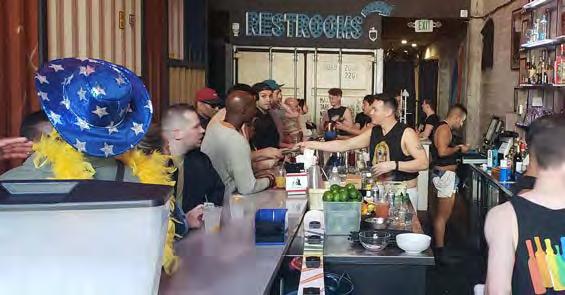
aged to come to our new club for drag shows, trivia night, brunch and to hang out with the community they made at The Port Bar.”
The bar proved its resilience by staying open during much of the COVID pandemic, and it endured vandalism to its front glass window in October 2023.
“I started ‘Wednesday’s a Drag’ here during COVID,” explained Camille Tow, who was in attendance at the closing party. “Originally, we were outside and everyone had to have a mask. We would have over 100 people sometimes. It was fucking wild.”
Camille is moving her talents to a Wizards and Wands-themed drag brunch at Rendezvous on Lombard Street in San Francisco.

In recent years, Port Bar’s drag brunch became very popular, adding to its trivia, karaoke, dance, and drag show weekly events.
Militia Scunt, a contestant on season two of “RuPaul’s Drag Queen of the Universe,” and a drag artist for 10 years, spoke highly of her times at The Port.
“This has been a very cute and very supportive venue for us over the years,” she said. “I won the very first talent show here. Since I’ve come back to the Bay Area, Sean and Richard have always been super-welcoming, so it’s been a home away from home for me.”
As to where she will perform next in Oakland, “Off to Fluid!” she said. Her friend Jax, another drag artist, concurred.
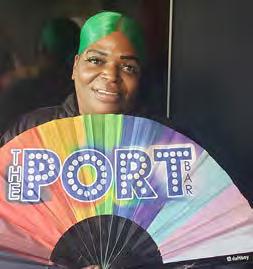
“I recently moved to the Bay Area, and when I’m in the city, the Port Bar has always felt the most diverse and inclusive space in the Bay Area. I feel really appreciated here.”
Safe space
Younger queers also found a welcoming space at Port.
Juan, a patron on the closing day, said, “I used to work here. I love the Port Bar. I worked here for six months and I’m sad it’s over. But we’re a big community and I’m glad I was a part of it.” His friend, Nathanial, agreed.
“I came here on my 21st birthday and have been coming here ever since. I’m looking forward to doing my first drag performing down the street.”
The Port Bar was also very popular with Oakland’s gay male community in addition to providing a real and cherished haven for East Bay lesbians, drag performers and trans and non-binary people, especially those of color.
With its steel shipping container décor, the Port Bar’s initial vibe was a variation on several popular Castro or SoMa gay venues.
“I still remember my first night here,” remembered a longtime gay patron. “I was returning from a Christmas party in Berkeley and driving home. I really wanted to go out, but not to cross the Bay Bridge and was wishing there was a gay bar in Oak-

but we are still very connected to San Francisco,” he said. “Thanks to the miracle of VPN technology, my local 5pm news is still from San Francisco, except that it’s on at 2am in Spain. And, of course, I still subscribe online to the Chronicle and the Bay Area Reporter. We do miss things about San Francisco, drag at Oasis, cabaret at Martuni’s and Feinstein’s, jazz at SF Jazz, but mostly we miss friends. We’ve been fortunate to have had many friends from San Francisco come to visit, including Carly Ozard and Sister Roma. We’re hoping that many more will come to see us.”t
‘Russ Lorenson, Standard Time: Live in New York,’ available as radio edit or live version, $9.49, MP3 with Music Unlimited. www.russlorenson.com
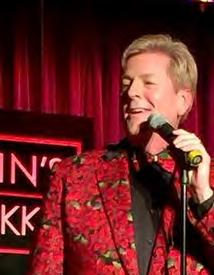
land with some good music and drinks, maybe a couple of hot shirtless bartenders and a gogo boy, with an age and racially diverse crowd. I walked into Port, and there it all was.”
Landlord problems
As has been reported in local and business press, despite nearly nine years of business success, resilience, and community engagement, the Port Bar was closed by the whims of an investment property owner. Phil Leong of Alameda Bayfarm Investment had long hounded the owners about providing entertainment not in keeping with their lease for “a bar that serves liquor.”
The owners pointed out that all their activities were in keeping with other bars in the area, as allowed by their lease, and all were permitted by the City of Oakland. After Leong refused to renegotiate their lease despite months of effort, Sullivan, and Fuentes had no choice but to close the bar.
While closing of the Port Bar is a huge loss to the East Bay LGBTQ community, Fluid 510 remains. Another recently opened option is Que Rico Nightclub, which serves fans of Latin music, drag acts and gogo dancers, at 381 15th Street.
An additional new queer space, Town Bar & Lounge, opened in spring 2023, at 2001 Broadway, is only one block away from the Port Bar.t
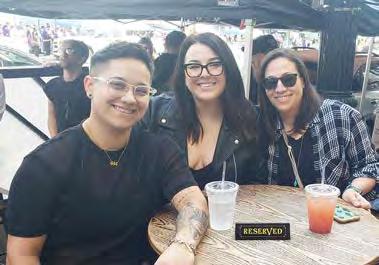
16 • Bay area reporter • February 29-March 6, 2024
t << Music & Farewell
Singer Russ Lorenson
Courtesy Russ Lorenson
Russ Lorenson at a concert at Feinstein’s at the Nikko
Courtesy Russ Lorenson
The Port Bar, busy to its last day
Stephen LeBlanc
Left: Bartender Bernard at Port Bar’s closing party Middle Left: Wednesday’s a Drag host Camille Tow Middle: Port Bar’s security guard Chantal
Middle Right: Militia Scunt and Jax at Port Bar’s closing day Right: Patrons enjoy the sidewalk parklet on Port Bar’s last day
All photos: Stephen LeBlanc
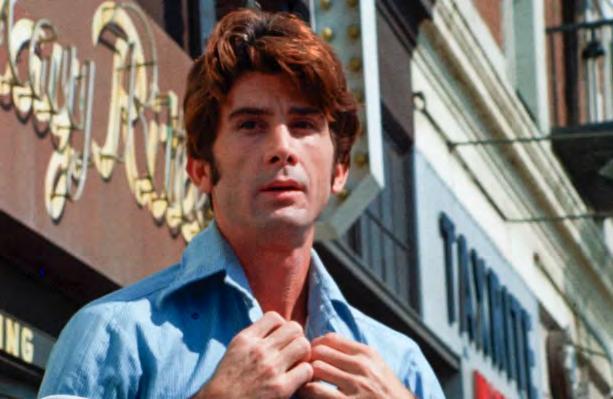 by Gregg Shapiro
by Gregg Shapiro
There is little doubt that 2023 was one of the queerest years on record when it comes to LGBTQ films, with Andrew Haigh’s dazzling “All of Us Strangers” receiving most of the praise and attention. With that in mind, 2024 has already gotten off to a good start beginning with the recent release of the lesbian comedy “Drive-Away Dolls,” currently in theaters.
In terms of home viewing, the late, gay filmmaker Pat Rocco’s 1974 feature-length drama “Drifter” (Kino Cult), which never received commercial distribution at the time of its release, remaining virtually unnoticed for 50 years, is now being given a new chance at life.
Newly available on Blu-ray and including special features such as four of Rocco’s short films, as well as audio commentary by Finley Freibert, a film historian, “Drifter” may finally find an audience. Classically low-budget and independent through and through, “Drifter,” features a screenplay by Edward Middleton, who also wrote the novel on which it’s based.
After grabbing a quick bite to eat at a bar and grill in the desert, bisexual hitchhiking hustler Drift (Joed Adair) hitches a ride to Hollywood with gay art dealer Geno (Joe Caruso). They spend the night together and Geno, who “knows a few people,” offers to help Drift out by making some introductions.
After popping into an adult bookstore, where he peruses the straight and gay porn (he’s bi, remember?), Drift meets Wagner (Dean Shah-Kee). The guys go to the movies and then back to Wagner’s apartment where they have sex (although Drift doesn’t kiss). The next morning, after Wagner has left for San Francisco, his female roommate Klamath (Bambi Allen) gets home from her cocktail waitress gig and finds Drift in the bed. They rap, as the kids used to say.
Drift meets with Maxine (Ann Collins), at her job placement office. His work experience is limited (ranch hand, gas station attendant, pipeline layer), and she’s rude to him until she discovers that it was Geno who sent Drift her way.
It turns out, Maxine is a madam, and arranges a paying gig for Drift the next day. In need of money to buy better

threads, Drift pays a visit to Geno, who gives him the bread, but with strings attached. Drift must agree to do a job for Geno involving a private party with some businessmen (which isn’t as gay as it sounds).
Drift also encounters Karen (Inga-Maria Pinson), a young Swedish woman to whom he’s attracted. They spend the day together, which includes
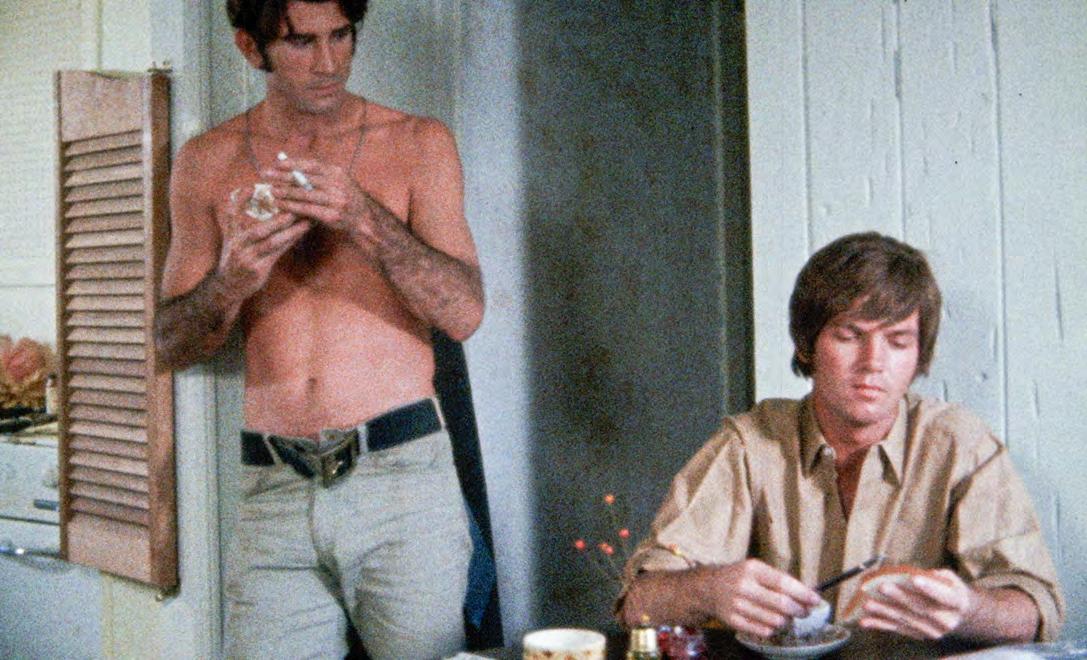
a kooky amusement park montage. But it’s unclear if they’ll ever meet again (semi-spoiler alert: they do!). Meanwhile, Drift’s assignation with his 50-year-old interior-designer client Dana (Gerald Strickland) goes in an unexpected direction, one that involves a reference to transitioning that could resonate with contemporary viewers. Interwoven throughout are a series
of flashbacks to a previous relationship Drift had with Steve (David Russell), a man closer to his own age, that he met while hitchhiking in Arizona. These scenes are some of the better ones in the movie.
Overall, “Drifter” is admirable for going where few films in the mid-1970s would dare to venture. The acting is dismal but serves as a reminder of how far
independent queer cinema has come in 50 years. Adair is in great physical shape for the period and spends much of the movie with his shirt more than half unbuttoned, completely shirtless, or nude. Groovy, if more than a little amateur, “Drifter” is worth seeing for its place in queer cinema. Rating: C+t www.kinolorber.com

February 29-March 6, 2024 • Bay area reporter • 17
t
>>
‘Drifter’ Pat Rocco’s 1974 bisexual hustler film rereleased
Film
hate crime and get support, go to https://www.cavshate.org/.
This
resource is supported in whole or in part by funding provided by the State of California, administered by the California State Library in partnership with the California Department of Social Services and the California Commission on Asian and Pacific Islander American Affairs as part of the Stop the Hate program. To report a hate incident or
Left: Joed Adair in ‘Drifter’ Right: Joed Adair and David Russell in ‘Drifter’
Both photos: Kino Now
by Michele Karlsberg
Lesbian mystery and thriller authors, with their deft pens and uncanny ability to navigate the complexities of human relationships, have carved out a unique niche within the genre. From navigating the shadows of clandestine affairs to unraveling the intricacies of psychological intrigue, these writers skillfully blend elements of passion and suspense, creating narratives that captivate readers with both the allure of forbidden romance and the pulse-quickening suspense of a well-crafted mystery or thriller.
As they illuminate the complexities of love and danger, these storytellers challenge traditional literary boundaries, offering readers a riveting and immersive journey into a world where secrets abound and the thrill of discovery is intertwined with the intricacies of the heart.
J.M. Redmann has published ten novels featuring New Orleans PI Micky Knight. Her first book was published in 1990, one of the early hard-boiled lesbian detectives. Her books have won three Lambda Literary Awards. “The Intersection of Law & Desire” was an Editor’s Choice of the
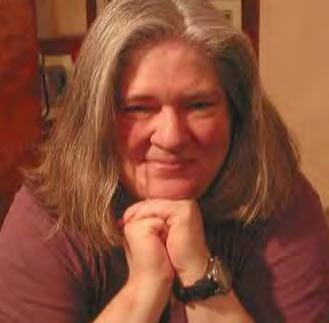
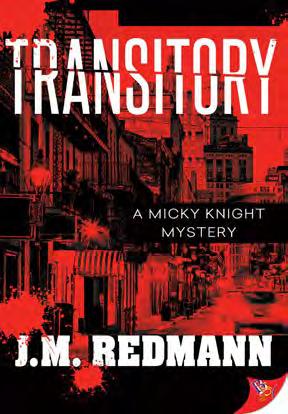
San Francisco Chronicle and a recommended book by Maureen Corrigan of NPR’s Fresh Air. Two books were selected for the American Library Association GLBT Roundtable’s Over the Rainbow list and “Water Mark” won a ForeWord Gold First Place mystery award.
She is the co-editor with Greg Herren of three anthologies, one of which, “Night Shadows: Queer Horror,” was shortlisted for a Shirley Jackson award. Her books have been translated into German, Spanish, Dutch, Hebrew and Norwegian.
Terry Wolverton is author of eleven books of poetry, fiction, and creative nonfiction, including “Embers,” a novel in poems, and “Insurgent Muse: Art and Life at the Woman’s Building,” a memoir that received the Judy Grahn Award for nonfiction from Publishing Triangle.
Her twelfth book, “Season of Eclipse,” a novel, is forthcoming from Bella Books. She has also edited fifteen literary compilations, including (with


Robert Drake) three volumes each of the Lambda Literary Award winning series “His: Brilliant New Fiction by Gay Men” and “Hers: Brilliant New Fiction by Lesbians.”
Michele Karlsberg: It’s said that lesbian readers prefer romances and not mysteries or psychological thrillers. As writers of the latter, do you buy that premise?
J.M. Redmann: In general, romance constitutes a large share of books sold; that’s likely true for lesbians as well. Finding someone to love and spend a life with is one of the most profound journeys many of us take. Why not live or relive it in a book?
I think lesbians read as many diverse books as all other readers. It may also be what is available and visible. Who publishes books with accurate lesbian representation? How do lesbian readers find those books? Small publishers produce most of the books and they have to have a keen eye on the bottom line to survive. How much of a risk can they afford to take with a book that might not find an audience? I’ve heard lesbians talk about the mainstream mystery writers they like, and my ego likes to think they don’t know about all the queer crime writers rather than thinking we don’t write good mysteries.
Terry Wolverton: I find it impossible to generalize about “lesbian readers.”
Many lesbians I know don’t particularly seek out lesbian content per se; they want to read whatever is new and interesting and talked about. This is different from when I came out in the 1970s, when there was a genuine hunger for content that reflected our lives.
For lesbians in major metropolitan areas, I think that craving has been satisfied or can be easily. In other parts of the country or the world, that hunger for self-reflection may still be keen. Some readers of any persuasions read for escape. Romance is a genre that allows you to immerse yourself in a hotter, sexier world than most of us live in day-to-day.
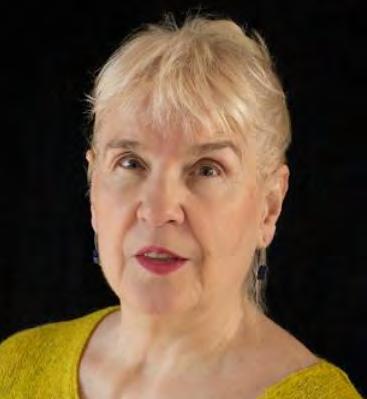
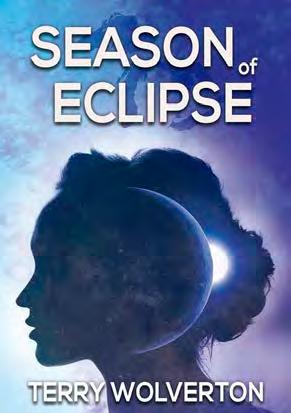
Do women characters have limits that male characters don’t, like how violent they can be, or how casual the sex is?
Terry: I’ve received feedback that my female characters are not sufficiently “likeable.” This seems rooted in a gender stereotype that is imposed on both protagonists and authors. Bret Easton Ellis wrote about a serial killer, and no one told him his character should be more “likeable.” It’s related to the notion that men can tackle the big serious issues, and women should approach subjects that are more pleasing or decorative.
In “Season of Eclipse,” my protagonist Marielle is difficult; she’s driven by ego and vanity and gets taken down. And she engages in two instances of casual sex and resorts to violence in self-defense.
J.M.: In the early books my main character, Micky Knight, was a bit of an asshole; sometimes still is. But, like life, there are limits that women face and men don’t. Our characters can be violent and have sex, but we have to write about the context in a way men don’t. Some of the macho mystery guys can be very violent, with minimal thought. Maybe It’s just me, but I have moral quandaries about killing everyone off. Was the man guarding the gate bad or just needed a job to feed his kids?
In what ways can a thriller or mystery also contain social observation and critique?
J.M.: Mysteries are about justice, seeking it if not always finding it. By writing about lesbian protagonists being the ones who seek justice and therefor the ones who decide what justice is, that alone is a major social critique. Crime novels are about ways in which the world is broken and it’s important to not look away from those broken places. Crime can be committed by those with power and those who are desperate. We need to look at how they
gained that power and why some people are desperate.
Terry: I love that answer! Both genres tend to take place in a world beyond the personal and are driven by external events. Because the action takes place in the world, the writer can’t help but comment upon its structures and systems. And it’s the outsider who usually has a cleareyed perspective on those systems, so lesbians are perfect protagonists for thrillers and mysteries.
Do women view justice, and its evil twin, retribution, differently?
Terry: I think what determines our view of justice is not only gender but race, class, religion, other positionalities. Some people require retribution to feel justice is served. Others see vengeance as perpetuating an unending cycle of violence. Marielle takes the actions she does not for justice but because she’s determined to survive.
J.M.: I think these are the questions we have to ask ourselves as writers; when is it justice and when is it vengeance? As lesbians, one of the many groups who have been other, outside the law, justice may mean something different for us. What is justice in an unjust world? I’ve always looked for a moral balance in my books. If Micky harms/kills the bad guys, can the ethical scale justify it? An early editor wanted me to not kill a character, but I felt that if he wasn’t killed, the end of the book wouldn’t be justified.t
www.jmredmann.com
www.terrywolverton.net
www.bellabooks.com
www.boldstrokesbooks.com
Michele Karlsberg Marketing and Management specializes in publicity and marketing for the LGBTQ community. This year, Karlsberg celebrates 35 years of successful campaigns.
www.michelekarlsberg.com

18 • Bay area reporter • February 29-March 6, 2024 Words: J. M. Redmann and Terry Wolverton t << Books & Events AUTO EROTICA PURVEYOR OF VINTAGE PORN MAGAZINES BOOKS PHOTOGRAPHS 4077A 18th St. OPEN EVERY DAY 415•861•5787{ { AUTO EROTICA PURVEYOR OF VINTAGE PORN MAGAZINES • BOOKS • PHOTOGRAPHS 4077A 18th St. OPEN EVERY DAY 415•861•5787{ { AUTO EROTICA PURVEYOR OF VINTAGE PORN MAGAZINES • BOOKS • PHOTOGRAPHS 4077A 18th St. OPEN EVERY DAY 415•861•5787{ { WE BUY & SELL GAY STUFF! MONDAY-SATURDAY Going out We’ve got the most comprehensive LGBTQ and queer-friendly nightlife info in the Bay (like YouNique at Beaux; see photo), along with dozens of arts events. Check out our online listings, this week and every week in Going Out. Beaux
ersonals Massage>> EDUARDO 9” Express massage in tension level and happy ending without pain. Text me 628-219-3747 Author J.M. Redmann
Terry Wolverton
P
Author
Spring books 2024 round-up, part 1
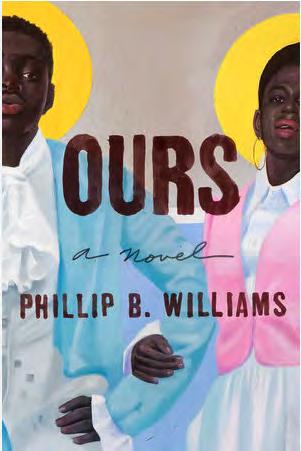
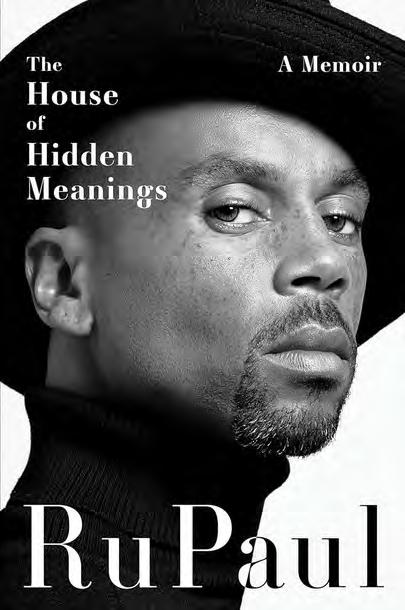
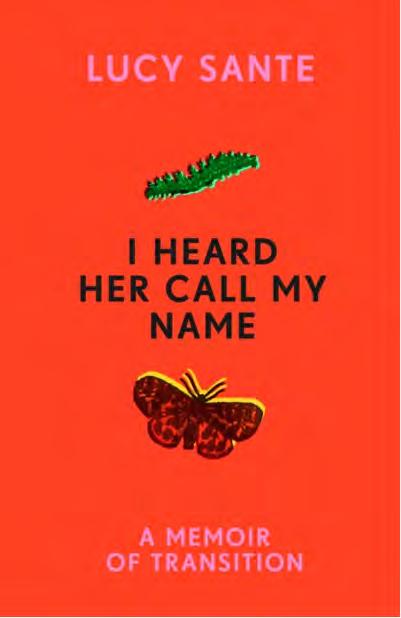 by Jim Piechota
by Jim Piechota
Though the weather is still wet and wintry, spring is finally upon us. For those of you who love to read, the sheer volume of queer books publishing this season is astounding. We’ll encapsulate as many exciting new titles as we can here in this new Spring Books Round-Up series.
For this first part, we’ve got an amazing debut by a Southern writer, a welcomed return to the “Tales of the City,” and a poetically written memoir by a celebrated Black writer. These queer selections are in stock or coming soon to physical and online bookstores. Start the new season with a new and fantastic book.
FICTION
“Ours” by Phillip B. Williams
$32 (Random House)
Award-winning poet and writer Phillip Williams has crafted a mesmerizing, mythical, multilayered portrait of a unique Black American community formed by an omnipresent witchy woman named Saint. Set in the 1830s near St. Louis, Saint has become an Antebellum South-era legend by cast-


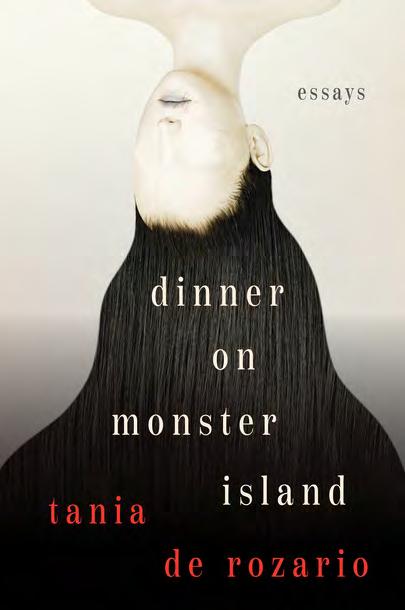
ing wicked spells on plantation owners, thereby rescuing and freeing legions of slaves who flock to her all-black community called “Ours” to thrive free from persecution and abuse.
Saint has cloaked the community and its land with a magical protective coat, shielding it from interlopers and outside influences. But a new group of conjurers from New Orleans arrives with plans of their own. Embedded within the fabric of this engrossing Southern saga (it clocks in at 580 pages, but readers won’t notice) are daring questions about the nature of liberation. At what cost to the citizens of Ours is Saint’s protection granted? Williams’ prose is graceful and eloquent in a story that is big and beautiful as it probes the terms and conditions of true freedom. Don’t miss it.
“Mona of the Manor” by Armistead Maupin, $28.99 (Harper) March 5
In this witty and effortlessly vibrant new installment in the “Tales of the City” series, readers become reintroduced to Mona Ramsey, who has become widowed after marrying Lord Teddy Roughton to secure his
American resident visa. His death has left her the sole heir to his expansive London Easley House estate which is where the action, set in the early 1990s, all happens.
Together with her adopted gay son Wilfred, 26, they become accidental innkeepers where a feuding North Carolina couple decide to stay and stir up trouble. Toss in the enduring epidemic of the era, Mona’s artistic girlfriend, and an adorable cameo appearance by Anna Madrigal and Michael Tolliver, and you’ve got the ultimate Maupin experience with all the queer trimmings.
MEMOIR
“The House of Hidden Meanings” by RuPaul Charles, $29.99 (HarperCollins) March 5
Former books by RuPaul have delivered inspirational if candy-coated advice and philosophies on the pursuit of personal style and personal liberation. But here, he lifts the shimmery sequined veil of his celebrity persona to let us have a glimpse into his past.
His memoir is intimately personal and sticks to RuPaul’s roots prior to his pioneering celebrity and householdname fame. Inheriting independence from his beloved mother and grandmother and stage presence from his mostly-absent father, Charles became an outspoken character in New York City studying the personas of Cher and Diana Ross and doing drag just for fun.
When stage performances began to become a serious and creative way to express himself, the “mother” of drag fully embraced it as a lifestyle and a moneymaker. He also reveals how he met and fell in love with his long-term partner Georges LeBar, and the life they mapped out together, despite the expected highs and lows. “Drag Race” fans will be disappointed, however, as the book concludes just short of the show’s debut, leaving out all the early creative inspiration and melodrama which made the series the sensation it is today.
RuPaul will be in San Francisco on his global book tour on March 14 at the Curran Theater, 445 Geary Street at 7:30pm. Tickets at broadwaysf.com
“Ten Bridges I’ve Burnt: A Memoir in Verse” by Brontez Purnell, $17 (MCD/FSG)
This inspired and unconventional memoir uses poetic verse to personify queer Black life in America. Outspoken, gritty, and raw as ever, Lambda Literary Award-winning author Purnell displays immense talent as a poet in these expressive verses on his sexuality, his desire, his need for love and attention, and his search to vanquish his outsider perspective and pursue an authentic identity.
Purnell’s internal frustration with sex, pleasure, failure, and gelling with others is consistently delivered on his own wry terms: “I’m so fuckin’ over me/I can’t even make myself hard for me anymore,” he writes. Poetry fans will find Purnell’s raw, earnest honesty refreshing, provocative, and beautifully unvarnished.
“I Heard Her Call my Name” by Lucy Sante, $27 (Penguin Press)
This moving complex memoir chronicles Sante’s later in life gender transition while in her mid-60s. She writes candidly and eloquently about suffering in silence with gender
“We often cause ourselves suffering by wanting only to live in a world of valleys, a world without struggle and difficulty, a world that is flat, plain, consistent.”
dysphoria in her beloved New York homeland for a good portion of her life until she finally embarked on the transformative journey from male to female. That emotional life-changing decision and the ensuing physical and mental challenges she faced (coming out to others, sartorial choices, etc.) comprise much of the remaining chapters in the book.
When she began taking her transition to the next level, she experimented with the gender-switching features on the mobile photo editor FaceApp in impressive ways; these images are shared in the book. Sante, who is a celebrated Belgian-born American writer and artist, contributes introspective analysis of the conundrums of identity in American society through her intimate unique lens, which only creates a more enticing informative reading experience for readers of both trans and cis identifications.
NON-FICTION
“Dinner on Monster Island: Essays” by Tania De Rozario $17.99 (Harper Perennial)
De Rozario grew up overweight,
multiracial, and queer in Singapore, and her experiences are impressively committed to the pages of this immersive, informed, and curiously written essay collection. Her lifelong self-perception as an outcast permeates (and sharpens) the narrative threads running throughout a book comprised primarily of short spurts of digressive experimental text and thin paragraphs of opinion and emotional expression. Of growing older and maturing, De Rozario laments: “I miss my ability to be vulnerable with unease. I miss my school stage swagger. I miss having no romantic game whatsoever, but still being cocky enough to walk up to a crush and hand her a terribly written poem on a horrendously handmade birthday card, convinced this is a good idea.”
She also takes time to academically reflect on women in horror (“Carrie,” “The Exorcist”) and how these identities reflect her own struggle to exist in a society that had consistently rejected her. This is a book to savor and reflect upon as it touches on emotions and impressions many of us have experienced at one time or another in our queer lives.t

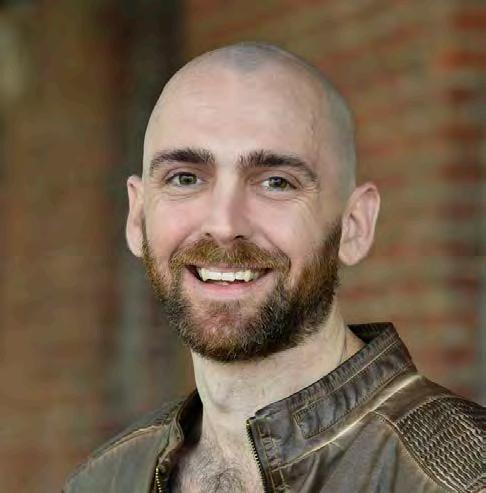





—bell
February 29-March 6, 2024 • Bay area reporter • 19
t
>> 3991-A 17th Street, Market & Castro 415-864-9795 Proudly serving the community since 1977. Open Daily! New Adjusted Hours Monday 8am (last seating 9:45pm) Tuesday 8am (last seating 9:45pm) Wednesday 8am (last seating 9:45pm) Thursday 8am Open 24 Hours Friday Open 24 Hours Saturday Open 24 Hours Sunday 7am (last seating 9:45pm)
Books
hooks StevenUnderhill 415 370 7152 • StevenUnderhill.com Professional headshots / profile pics Weddings / Events
Meet thousands of creatures under one living roof, and you’ll help us make ecosystems more resilient across the planet. Because every visit supports our mission to regenerate the natural world.
Get tickets at calacademy.org
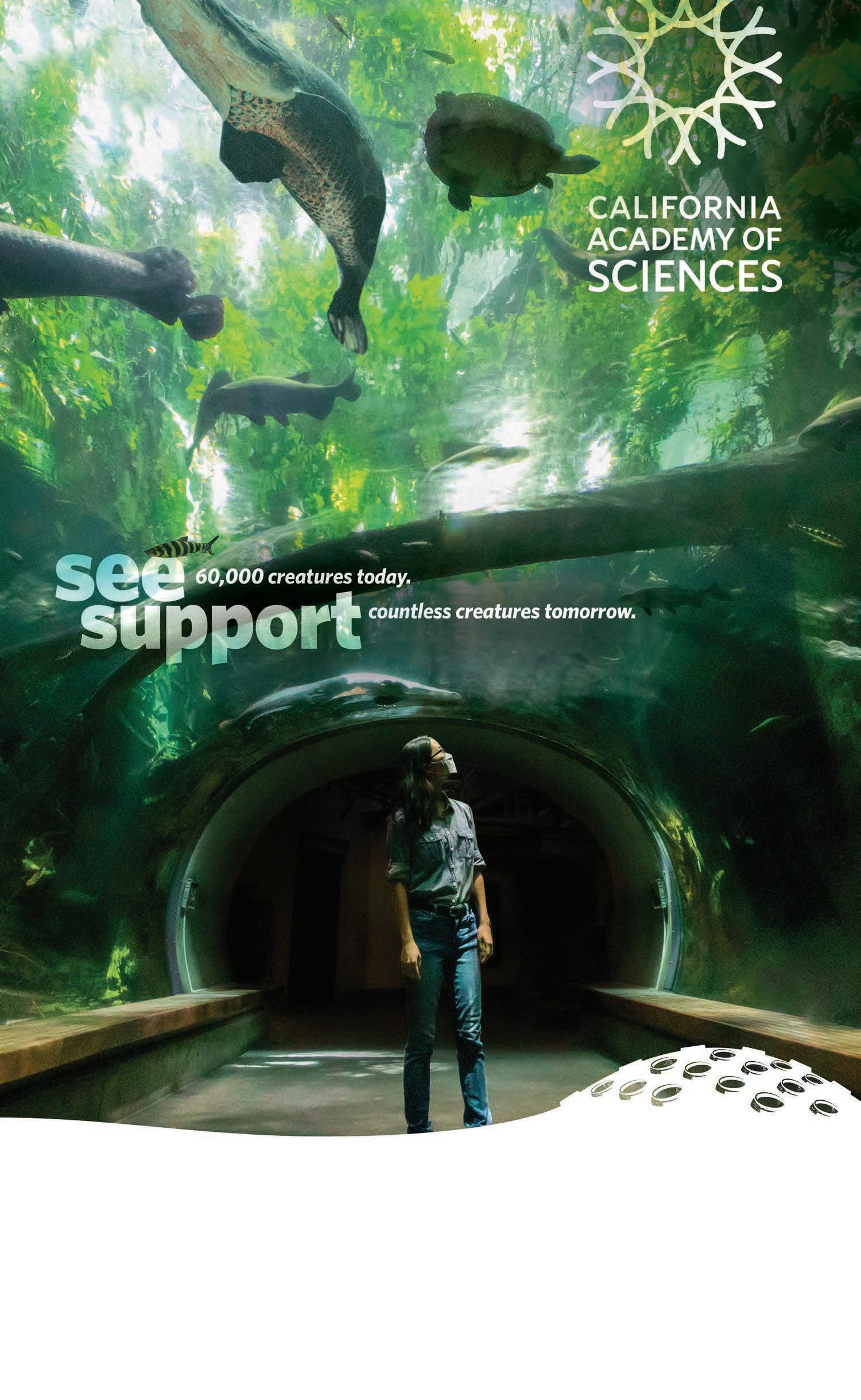
Spring in the Garden
March 9, 2024 - April 28, 2024
This spring, see super-sized animatronic insects at Bugtopia, make a splash with Riveropolis, and more!
32526-CAS-Evergreen-TodayTomorrow-Rainforest-Bay Area-9.75x16-02.22.24-FA.indd 1 2/22/24 4:20 PM
AQUARIUM + PLANETARIUM + RAINFOREST + LIVING MUSEUM



































































 MUSIC &
BY WILLIAM FINN
BOOK BY WILLIAM FINN & JAMES LAPINE
DIRECTED BY DeNNIS LICKTEIG
MUSIC &
BY WILLIAM FINN
BOOK BY WILLIAM FINN & JAMES LAPINE
DIRECTED BY DeNNIS LICKTEIG













 by Gregg Shapiro
by Gregg Shapiro












 by Jim Piechota
by Jim Piechota







